Performing & Visual Arts
COLLEGES AND PROGRAMS

HOW TO CREATE AN ATTENTIONGETTING PORTFOLIO SCHOLARSHIPS FOR THE ARTS
ARTS COLLEGES AND PROGRAMS TO CONSIDER




HOW TO CREATE AN ATTENTIONGETTING PORTFOLIO SCHOLARSHIPS FOR THE ARTS
ARTS COLLEGES AND PROGRAMS TO CONSIDER



GOT QUESTIONS OR SUGGESTIONS?
Email me at mschwartz@teenlife. com.
he world is a canvas, a stage, a symphony waiting to be composed. You are the artist, the performer, the conductor. Your vision and passion have the power to shape culture, inspire hearts, and redefine boundaries.
In an increasingly complex and interconnected world, the ability to think creatively, communicate with nuance, and understand diverse perspectives remains more valuable than ever. Arts graduates possess these qualities in abundance, with their unique blend of talent, intellect, and emotional intelligence positioning them to lead the way into the future.
Your Journey Starts Now
› Program led by Tony-nominated Broadway and West End producer, Jerry Goehring
› 12+ productions year-round with emphasis on new works
› Guidance from Broadway/Off-Broadway industry pros
› Performance, design and technical opportunities begin freshman year
› Top undergraduate program with option to double major or minor
› Grants and scholarships available
TeenLife’s 2024-2025 Guide to Performing & Visual Arts Colleges & Programs offers a roadmap to unlocking your full potential. It includes resources for funding your education, tips to create an impressive portfolio, and potential careers that blend technology and the arts. Don’t hesitate to request more information from programs and colleges that interest you via this handy online form.
Carpe diem. This is your moment. The next chapter of your artistic journey begins here. Let’s create something extraordinary together.

Marie Schwartz CEO and Founder, TeenLife Media


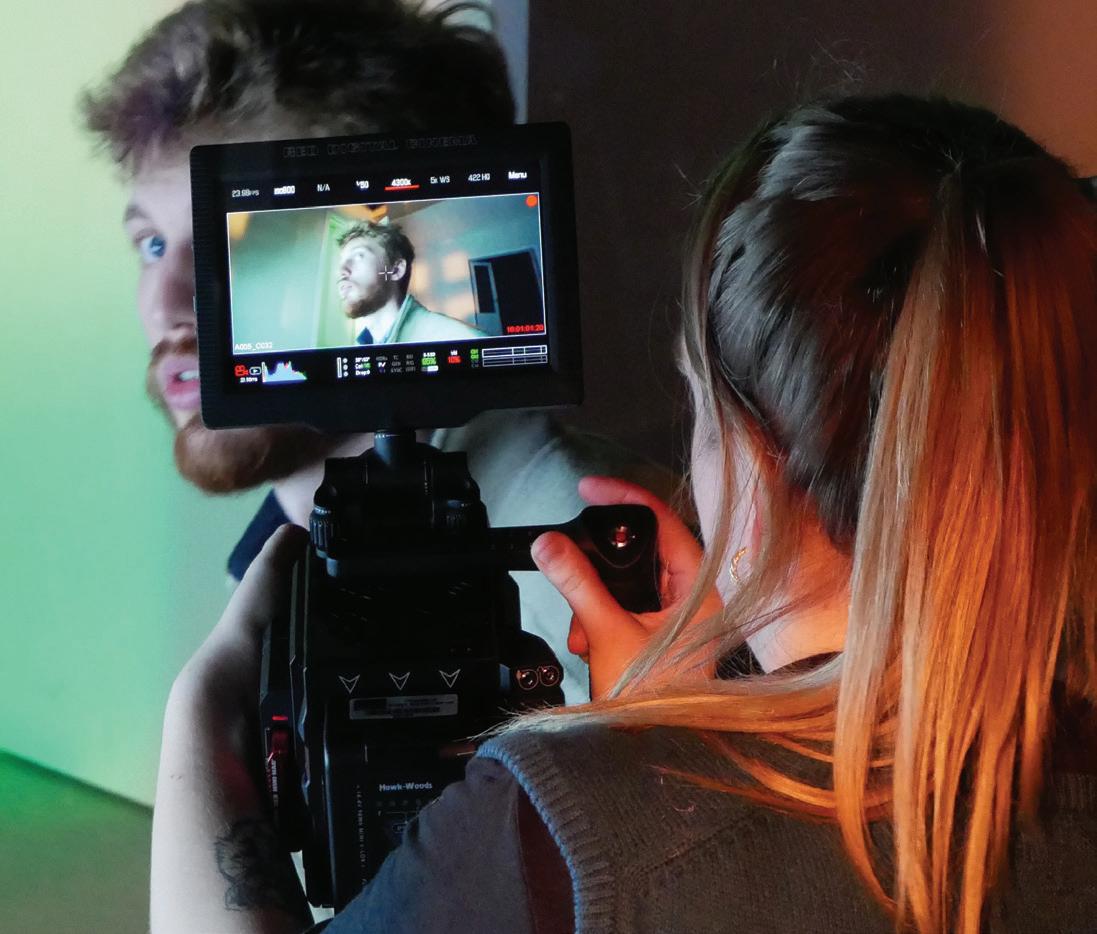

Marie Schwartz, mschwartz@teenlife.com
Managing Editor - Jodi Ireland, jodi@teenlife.com
Associate Editor - Nancy Li, nancy@teenlife.com
ADVERTISING SALES
Director of Sales - Brenda Boos, brenda@teenlife.com
Sales Account Manager - Jen Fisher, jen@teenlife.com
Sales & Support Manager - Regan Beiermann, regan@teenlife.com
Digital Marketing Strategist - Dustin Silvaer, dustin@teenlife.com
Director of Organic Marketing - Rachel D’Amato, rdamato@collegeadvisor.com
Kathy Tilton, kbtilton@gmail.com
This guide is published by USNCA TeenLife, a division of U.S. News & World Report.
To download a copy of this guide, go to https://www.teenlife.com/guide-to-performing-visual-arts-colleges/ and click on the down arrow under the flipbook.



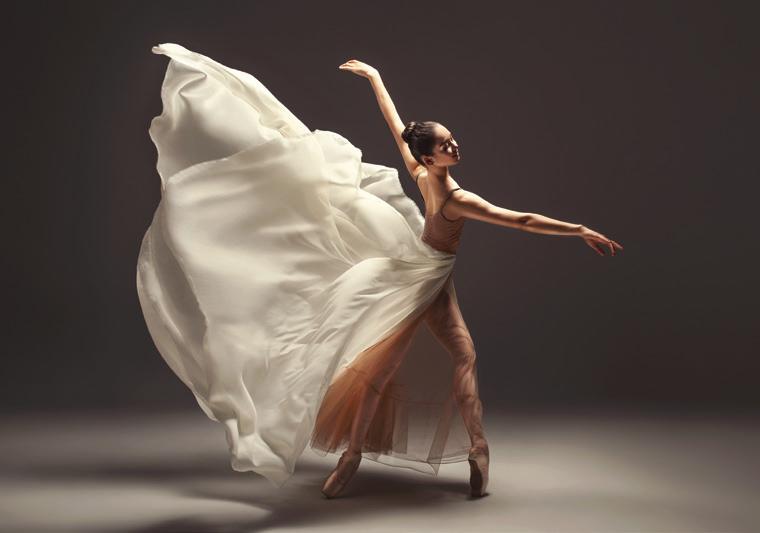
In-person conversations with regional representatives, email and social media messages with the school, your personal statement, and individual contact with faculty members make a difference. Communicate your interest in an institution — especially one you recognize is the best for you. Enjoy the process knowing you'll find a great "home" in the end.
Mary L. Smith, ‘00, Acting Director of Admissions for Recruitment and Selection, Liaison for the Sunderman Conservatory of Music



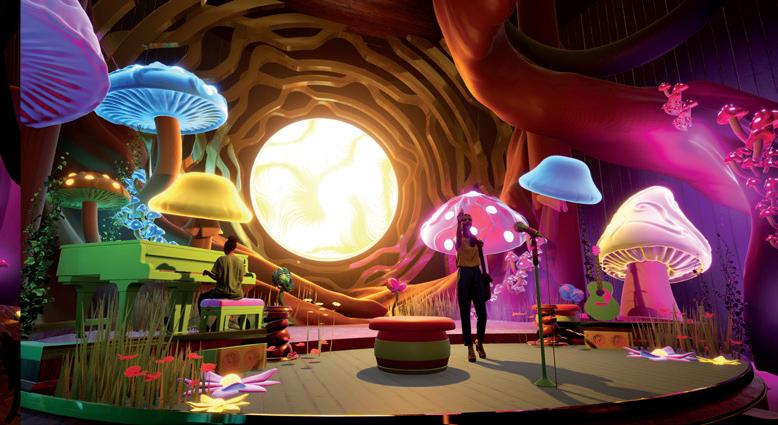








PreCollege was an essential part of my decision to choose Computer Animation as my major. When I first arrived at PreCollege, I was 100 percent set on pursuing Illustration because Computer Animation always seemed too technical for me. But when I started taking animation classes, I realized that I enjoyed them much more than I expected... even more than illustration! It took me about three to four days of computer animation classes for me to realize that this was what I wanted to do. Now, I am
starting my second year as a Computer Animation major, and I still love it. I’m very grateful that PreCollege helped me find the right path to follow at Ringling College.
What made you decide to attend Ringling College?
I chose to attend Ringling College of Art and Design because of my incredible experience at PreCollege. The level of education it provided, and my familiarity with the campus and curriculum after attending PreCollege sold me on the school.
Did PreCollege shift your perspective on the major you planned to go into or whether you wanted to go to an art college as opposed to university?
PreCollege only reinforced my decision to choose the computer animation program. I came to precollege to see if I would enjoy it and I did.
How would you spend a typical day in PreCollege?
My average day consisted of eating breakfast, going to my classes, and hanging out with my friends. Almost all of my days were very full and active, with both classwork and messing around with my friends.
What was your most memorable moment from that summer?
My most memorable moment from PreCollege was seeing the final product of my computer animation classes. Seeing the final rendered animation I created as a result of all my hard work was a very rewarding and fulfilling experience.
What advice would you give a teen considering going to Ringling College’s PreCollege program?
My advice to any new students coming to PreCollege would be to keep an open mind and see what you enjoy the most. What you thought was your favorite and what will actually become your favorite can be two vastly different things.

s college costs continue to climb, prospective students and their families increasingly question the value of nontraditional majors like art. While STEM fields often dominate the spotlight for their perceived career prospects, the reality is that the art world plays a pivotal role in shaping our society and economy.
“We could say that STEAM is the new STEM, as the world realizes that science, technology, enginering, and math reach next-level excellence when they’re enhanced by artistic perspectives — adding the “A” for the Arts,” said Chelsea Garner-Ferris, Director of Marketing and Communications at Ringling College of Art and Design.
After all, art is integral to our daily lives — from the design of products we use to the experiences we consume. The visual language developed by artists informs everything from advertising campaigns to user interfaces and experiences. As technology advances, the demand for creative problem-solving and visual communication skills grows exponentially.
An arts education enriches students’ lives in countless ways, too. Students trace the evolution of artistic techniques, styles, and themes from the earliest times to the present day. This historical perspective fosters a broader understanding of human culture and society.
Beyond intellectual growth, arts education nurtures empathy and compassion. Through exposure to diverse cultures and perspectives, students develop a greater appreciation for the human experience and a stronger sense of social responsibility.
Pursuing an arts degree instills a sense of purpose and motivation. The ability to create something tangible, whether a piece of art, a performance, or a design, fosters a feeling of accomplishment and personal fulfillment.
While many students enter college with a clear career goal, the true value of higher education often extends beyond immediate job prospects. A degree in the visual and performing arts cultivates a unique skill set essential for success in the modern workforce.
Visual and performing arts students develop critical thinking, problem-solving, and communication abilities through rigorous studio practice and theoretical coursework. They learn to synthesize complex ideas, conduct research, and present their work effectively. These students master discipline, focus, and time management as they navigate demanding projects and deadlines.
The collaborative nature of the visual and performing arts fosters teamwork and adaptability. Art students regularly engage in critiques and receive feedback, developing resilience to criticism and a capacity for constructive collaboration. They also learn resourcefulness as they manage budgets, materials, and studio spaces.
While the traditional notion of artists as solitary figures may persist, the reality is that artists are increasingly sought after for their skills in innovation, design, and problem-solving. They enjoy diverse and successful careers across various industries.
From advertising and marketing to technology and healthcare, creative professionals are driving innovation and shaping industries. Transferrable soft skills like time management, teamwork, and problem-solving are also valuable in the business, marketing, public relations, corporate training, and event management sectors.
Artificial intelligence (AI), through its capacity to learn from vast datasets and generate new content, is reshaping the artistic landscape. Recent advancements in AI-driven art creation have sparked debates about its potential to supplant human artists. But a more nuanced perspective suggests a future where AI and human creativity coexist and complement each other.
When it comes to using AI while earning a degree, James Huckenpahler, Professorial Lecturer, Corcoran School of the Arts & Design at the George Washington University, said, “I don't think anyone fully understands the implications of generative AI, just as in the late 1990s no one really predicted that from the internet would emerge social media or its consequent negative impact on the mental health of children and teenagers. The best defense I think I can provide to students is to encourage them to dive deep into generative AI with a critical mind: kick the tires, see what it can and can't do, and consider how it might be used against you.
“As a teacher of digital media, I set the rules of engagement on day one of class each semester: 1) Unless told otherwise, feel free to use generative AI for any assignment, BUT 2) you must cite the tool used and the prompt or input, AND 3) you must transform the output in some meaningful way, and be prepared to discuss/defend the final product. Using the tech will cause students to begin to intuit, and then form hypotheses about the bounds of what the tech can do.”
The performing and visual arts industry stands at a crossroads. While AI introduces unprecedented possibilities for artistic expression and production, it also raises questions about the role of human artists and the value of original works. Rather than a binary choice between humans and machines, the future likely lies in a hybrid model where AI serves as a tool to enhance creativity. AI automates certain tasks and even creates new artistic forms, but the demand for human ingenuity, emotional connection, and original thought will persist.
What better time than now to pursue a degree in the performing or visual arts, where students can participate in how the world adapts and harnesses AI’s potential while preserving the irreplaceable qualities of human creativity?
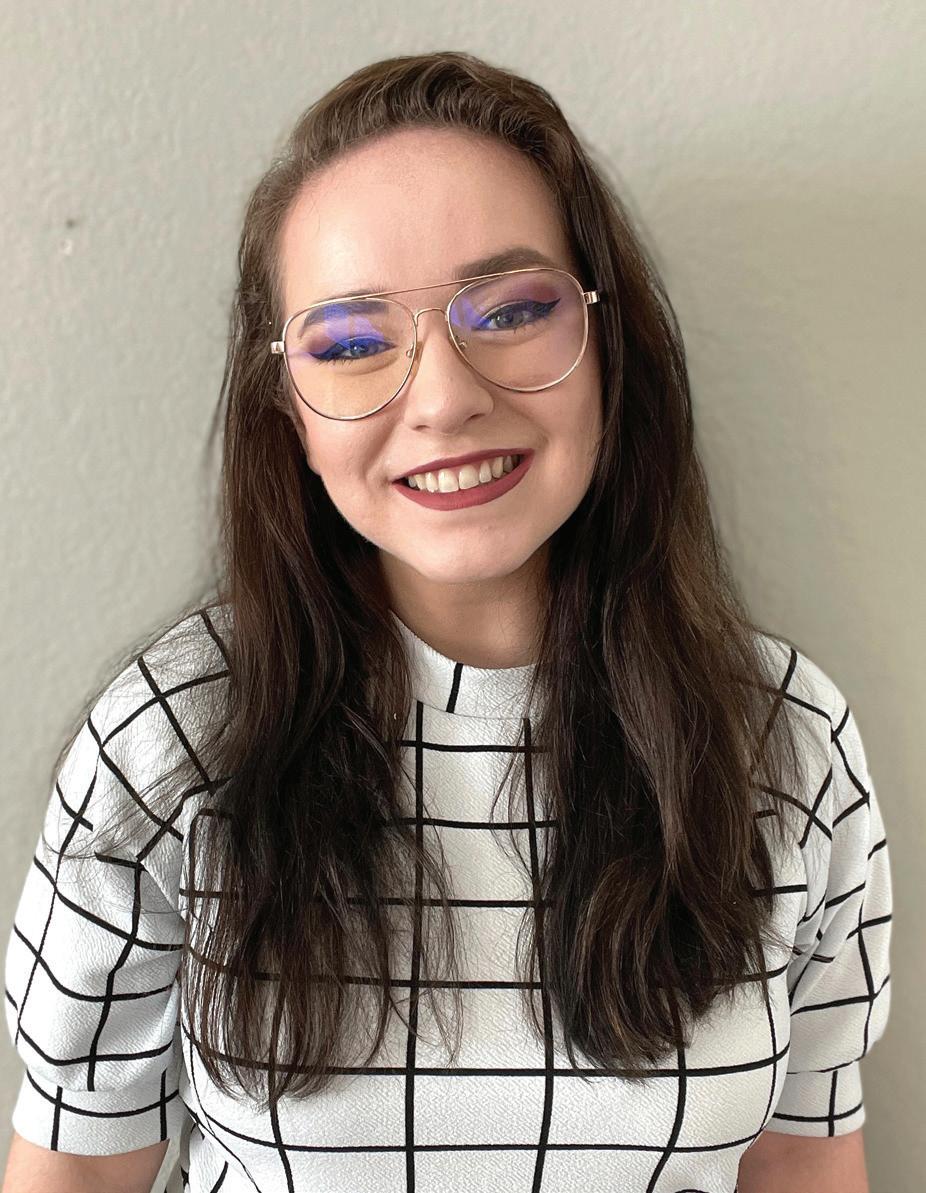
The Liverpool Institute for Performing Arts (LIPA)
I chose Musical Theatre because theatre has been part of my whole life. I truly believe there is a musical for everyone, and I believe there is a Stephan Sondheim quote for every situation or moment in life. I love every aspect that goes into making a musical and I want to be part of that in any way that I can. I chose LIPA to help me achieve this because I felt when I first walked into the building that this was a place for artists and creators. LIPA encourages students to explore every aspect of their creative abilities. I also felt that England in general was the best place for me to achieve my goals because of their love for theatre.
When I first applied and got accepted to the BA (Hons) Acting (Musical Theatre) course at LIPA, I hoped that when I graduated that I would have a better
understanding of how to intermingle all three elements of Musical Theatre. While I felt I could hold my own in two of those areas, I knew I needed work in the third. While being at LIPA I feel like I have grown in that aspect already and that helped solidify that I made the right choice.
I think to one day wake up and go “I want to go to this school for this” without any sort of preparation is a little silly. I'm not saying you need to be an expert by any means, but to have basic understandings of your chosen major is deeply important. When it came to preparing for my audition in general, I took time deciding the best material that showed my current abilities as well as my potential. The school will work with you on the rest. Always remember though, this is your journey – you know what’s best for you. And always be yourself, as always as corny as that sounds, being you is the best thing you can do.
A typical day at LIPA is filled with training and applying everything you have been given. You will explore methods and theories that go into your art, as well as learning about how the world around you will have an impact on your art form, and how you make art. You’ll have days where you work with people from other courses, you’ll have full rehearsal days, and sometimes you’ll have days that feel a little unsure about your journey. Just remember, you’re not alone and you were selected for a reason.
The most memorable moment I have at LIPA so far is when I saw that my plan to get free feminine hygiene products on campus come to fruition. I didn’t do it alone, but I felt like I could do that at this school and not receive any type of backlash from my lecturers or peers. It’s one little step in the right direction. I’m very proud of that.
The biggest advice I could give to any teen looking for the right college is to go with your gut. This is not only a big commitment, but it is supposed to set you up for your goals and dreams. If that means writing a Pro/Con list like Rory Gilmore, do it just don’t obsess. Don’t be afraid to communicate what you’re feeling to the people close to you as well. As the late and great Sondheim said, “Anything you do, let it come from you, then it will be new, give us more to see.”


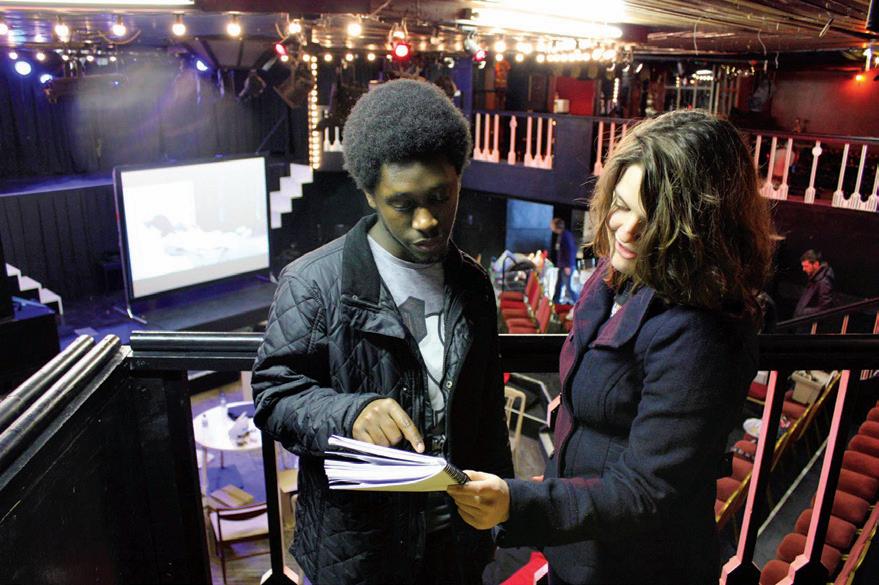

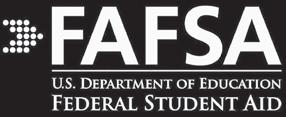


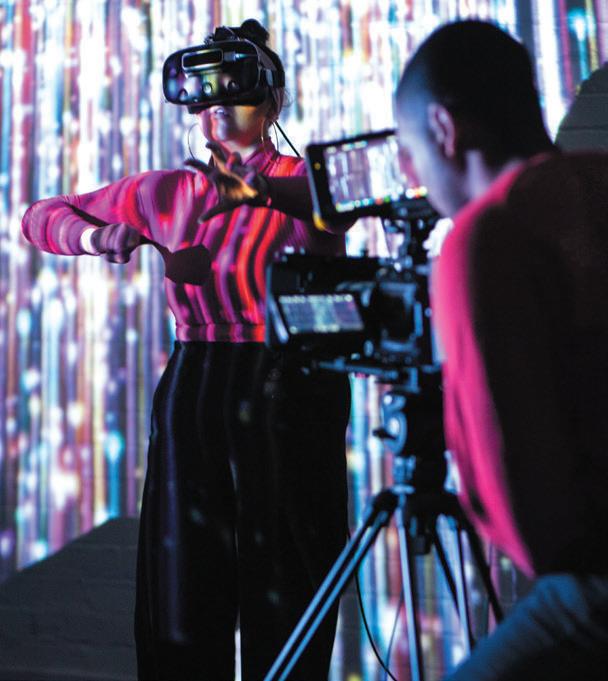

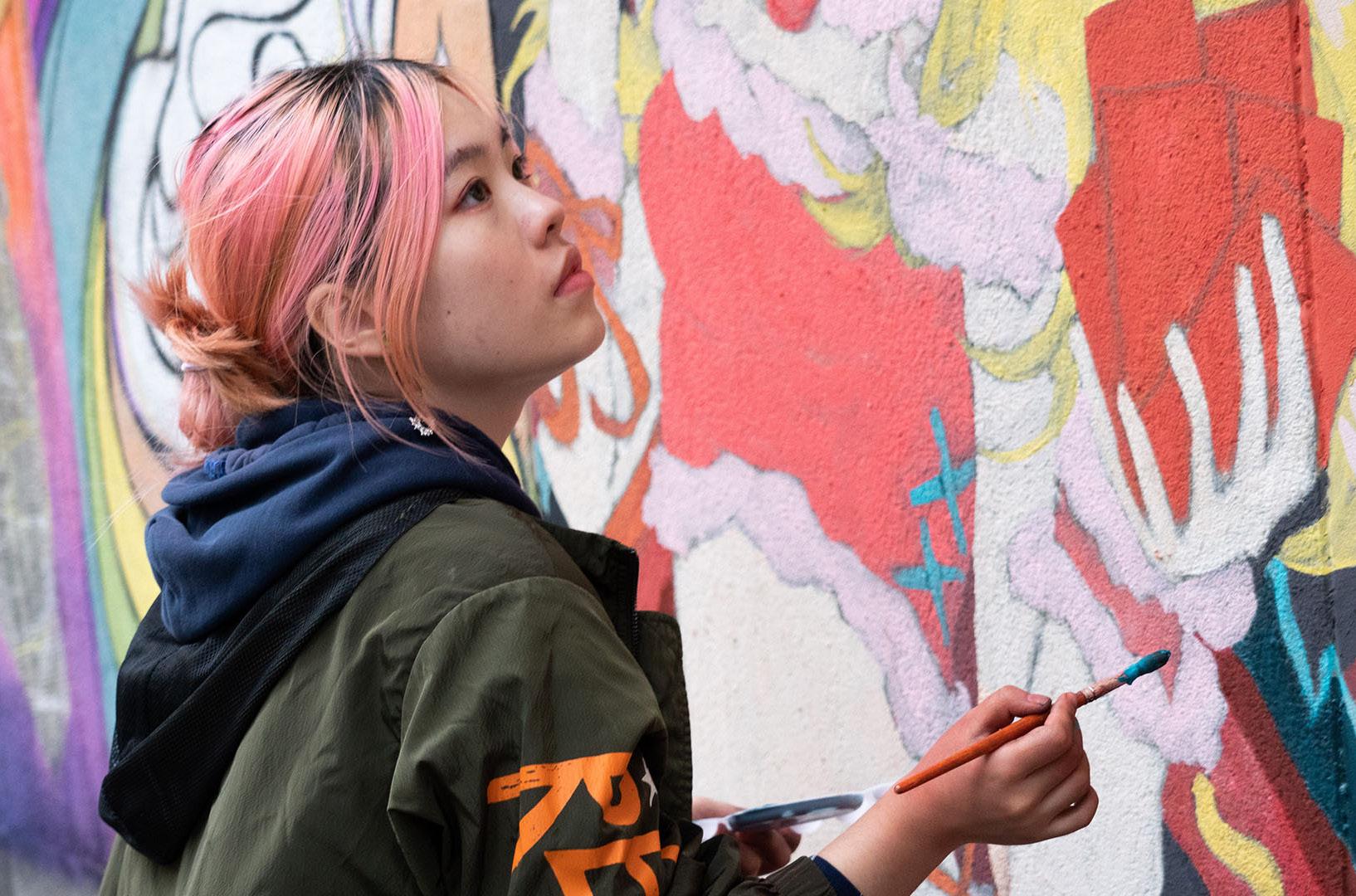
Looking for even more opportunities and professional organizations associated with the arts?
Check out these resources!
VISUAL ART & DESIGN
• American Institute of Graphic Arts (AIGA)
• The Art Career Project
• Artist’s Network
• Association of Independent Colleges of Art and Design
• Association of Photographers (AOP)
• College Art Association: Advancing Art & Design
• Doodle for Google
• International Game Developers Association
• National Association of Schools of Art and Design
• National Portfolio Day Association
MUSIC
• American Composers Forum
• Careers in Music
• College Music Society (CMS)
• Majoring in Music
• Music Teachers National Association
• National Collegiate Choral Organization
• Opera America
• Phi Mu Alpha Sinfonia
• Sigma Alpha Iota
• Student National Association of Teachers of Singing
THEATRE
• American Theatre Wing
• Black Theatre Network
• Costume Society of America (CSA)
• Get Into Theatre
• Hola. (Hispanic Organization of Latin Actors)
• International Thespian Society (ITS)
• National Alliance for Musical Theatre
• National Association of Schools of Theatre
• Stage Managers’ Association
• United States Institute for Theatre Technology, Inc. (USITT)
VISIT OUR BLOG TO SEE THE FULL LIST!
• The American College Dance Association
• Dance Informa
• Dance into College
• Dance Studies Association
• Dance US
• Dance USA
• The International Association of Blacks in Dance (IABD)
• International Association for Dance Medicine & Science
• National Association of Schools of Dance
• National Dance Education Organization (NDEO)
EDUCATIONAL RESOURCES
• American Documentary
• Art21
• Dance Magazine
• Folger Shakespeare Library
• GenArt
• Kennedy Center Arts Education
• National Endowment for the Arts
• New York Foundation for the Arts
• Open Arts Journal
• Sparketh Online Art Courses

hoosing between a conservatory and a traditional university is a pivotal decision for aspiring artists. Conservatories offer intensive, specialized training in a specific art form, immersing students in a dedicated artistic community. Universities provide a broader education with a performing arts major, allowing more exploration of diverse academic interests.
Unlike traditional colleges or universities, a conservatory is dedicated solely to studying and training music, dance, theater, or other performing arts. Attending these institutions allows you to laser-focus on your specific art while receiving intensive training
and having abundant performance opportunities to help you gain experience and showcase your talents.
Smaller class sizes facilitate personalized attention, fostering strong connections between students and faculty. If you love environments devoted to your art, a conservatory might be the perfect place to nurture your artistic growth and prepare you for a professional career.
Universities offer a more comprehensive approach to arts education, blending artistic training with a broader academic experience. You can explore more diverse subjects while still pursuing your passion for the performing arts. With access to extensive
ACADEMY | A renowned boarding arts high school providing a comprehensive college preparatory academic curriculum alongside pre-professional training in all arts disciplines.
SEMESTER EXCHANGE PROGRAM | A personalized educational experience for both International and Domestic 10th and 11th grade students for a single semester of artistic immersion.
POSTGRADUATE GAP YEAR | Offering high school graduates a customized curriculum to prepare for college auditions, portfolios, and professional life as an artist.
RESIDENTIAL SUMMER PROGRAM | Offering workshops for all ages and abilities on our picturesque mountain campus.
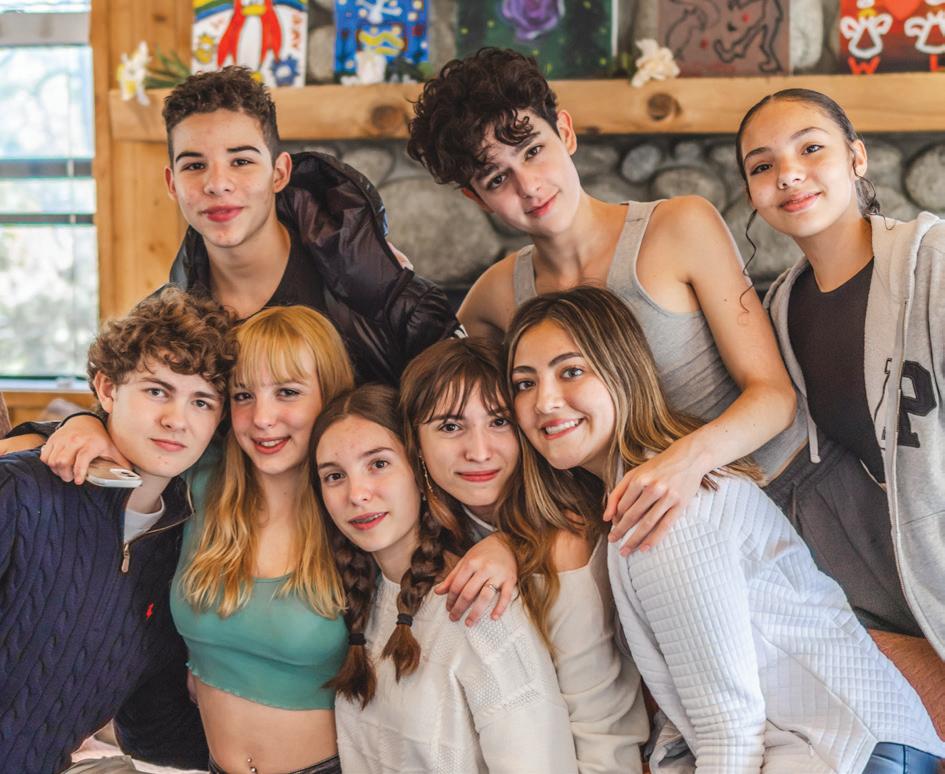

code to learn more, or visit idyllwildarts.org
resources, including libraries, research facilities, and extracurricular activities, you’ll experience a well-rounded environment perfect for personal and artistic development.
Unlike conservatories, universities offer a wide variety of majors and minors, enabling you to combine the study of your chosen performing art with other academic interests. This flexibility allows you to develop a well-rounded skill set and explore different career paths.
Hybrid options, like conservatories within universities, blend the best of both worlds, offering specialized training combined with a broader academic experience.
Dr. Travis J. Cross, Professor of Music at UCLA Herb Alpert School of Music and former music department chair, said, “My sense is that conservatory training programs and performance programs within university music schools are more alike today than they are different — and probably more alike than they have been in the past. In the broadest
stereotype, conservatories are more focused on direct training and preparation of performers, and university programs include a broader academic foundation, both musically and in areas outside of music. But no conservatory wishes to produce graduates who are not educated musicians or intellectually curious people, and no university program wishes to hold students to anything but the highest standards of performance.”
The type of degree you pursue — as well as your own aspirations, learning style, and career goals — will influence the path you choose. For music students, for example, a Bachelor of Music (B.M.) is the traditional conservatory path, emphasizing intensive music study with a foundation in the liberal arts.
A Bachelor of Arts in Music (B.A.) offers a broader education, balancing music courses with other academic subjects. Some institutions offer dual degree programs combining music with another field of study. A B.A. provides more flexibility if you have multiple interests or aren’t sure about your career path.























What did you hope to get out of the program, and did you achieve it?
I wanted to be able to continue to develop a ceramics practice, but by coming to Alfred University I was able to explore lots of different media and learn niche skills in neon and sculpture that I couldn’t have learned anywhere else while continuing in ceramics.
Did you have to prepare for this major in any way? If you didn't, do you wish you did?
I did prepare quite a bit in high school through art classes, but I quickly learned that Alfred University has a great Foundations program for first-year students that meets them where they’re at and helps them to quickly develop skills to be successful in the Arts.
What did a typical day look like?
A typical day at Alfred University consists of studio courses in the morning that teach skills in different mediums. Then the afternoon includes courses in Art History and Business that prepare me for careers in the arts. A large portion of my day also includes working in my studio on pieces, working at the Alfred Ceramic Museum, and my internship work in marketing, all of which help teach critical skills for career readiness.
What was the most memorable moment of your time at this college?
The most memorable moment for me was being able to have my own solo exhibition in the Turner Gallery on campus. It was really exciting to share my work with my peers and faculty after working so hard on them in the previous semester.
What advice do you have for teens looking for the right college?
Why did you choose Alfred University?
I chose to go to Alfred University because of the interdisciplinary nature of the Art & Design program alongside the ability to study outside of the arts in things like Business Administration and Literature. The intersections I could create were crucial to my decision and why I love studying at Alfred University.
I think it’s really important to explore lots of different colleges and learn about different programs. It’s important to find a school that fits all your needs and it’s always ok to keep looking for the perfect school for you. Don’t settle until you’ve found a school that feels right! A visit to campus is really important in getting a good feel for the school and its programs.
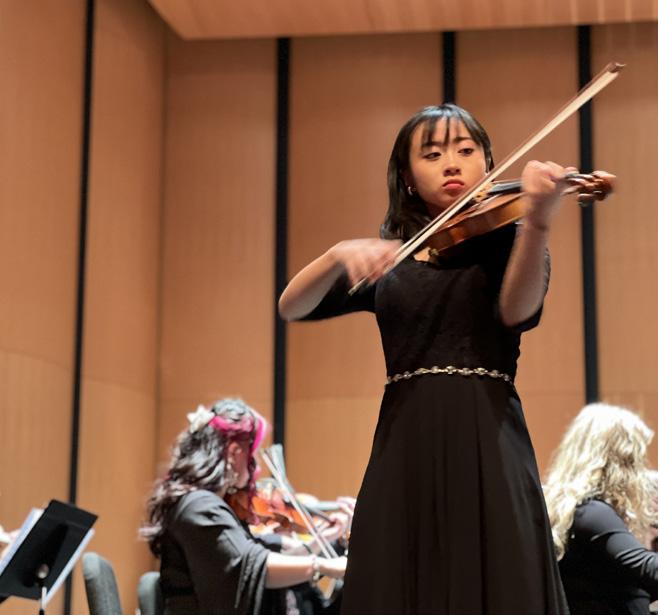
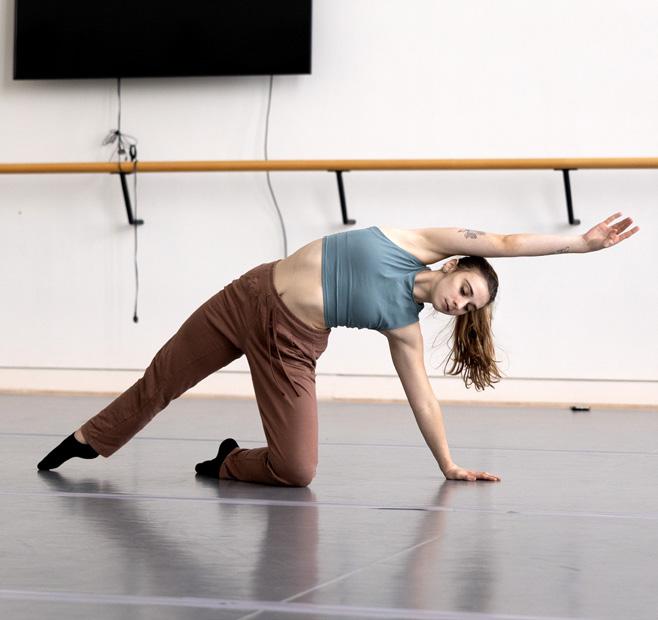

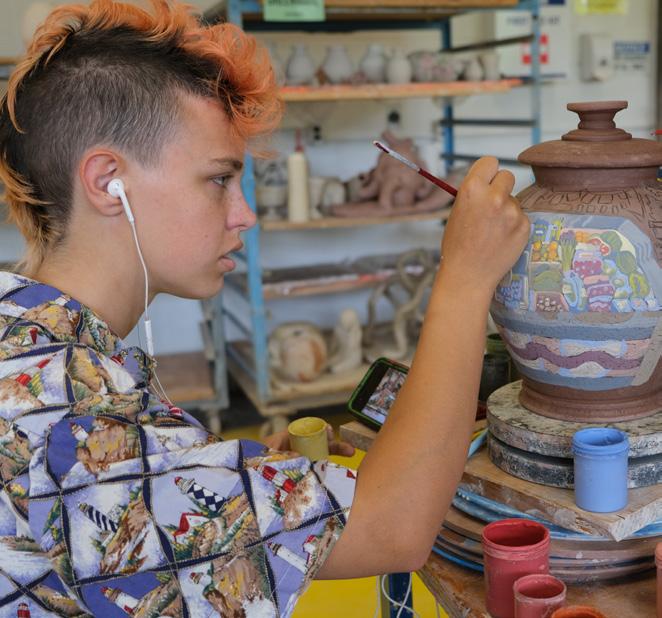
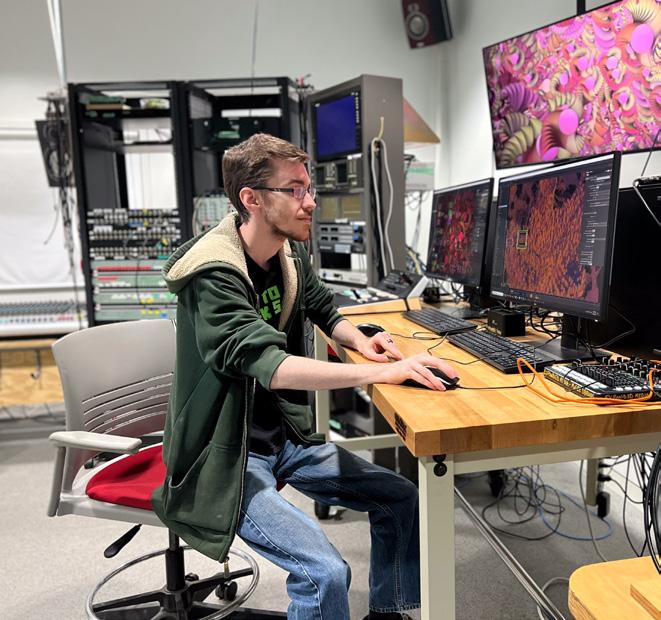
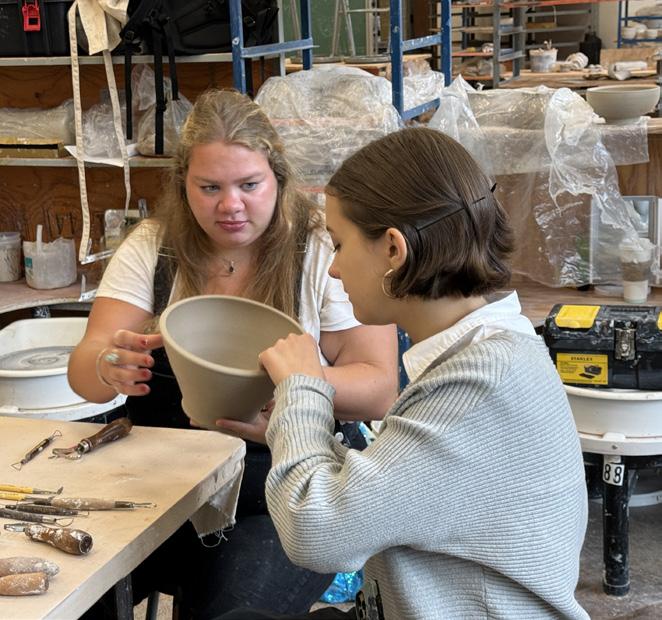
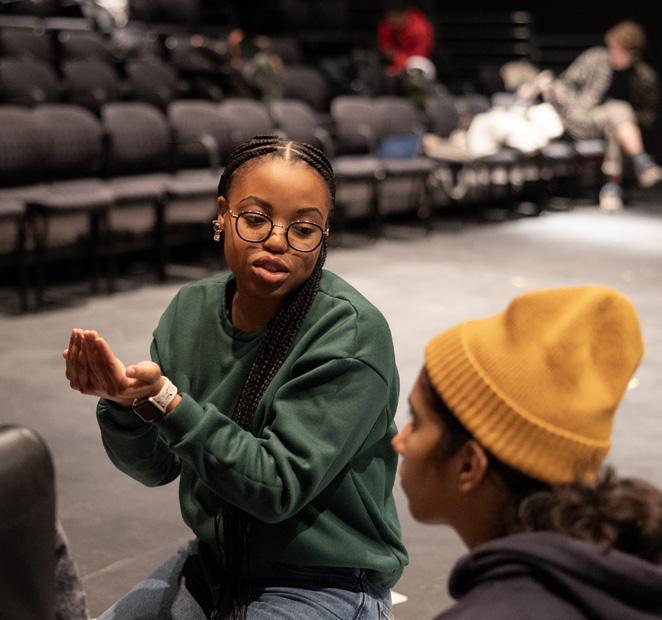

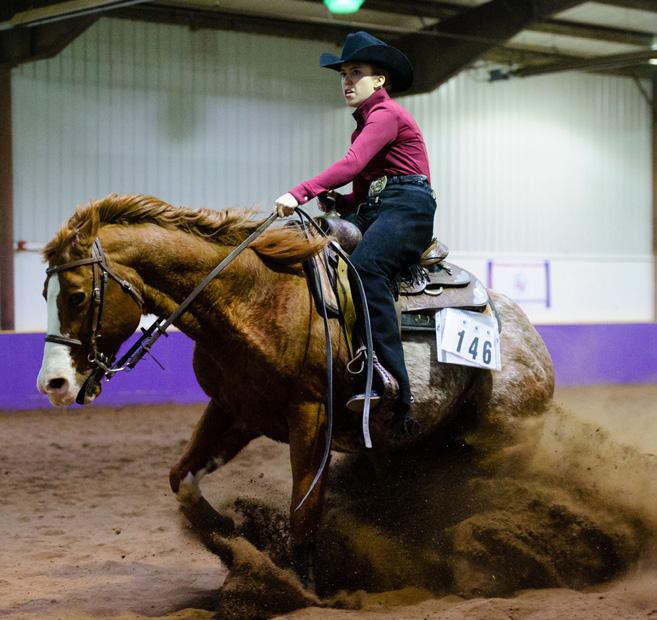
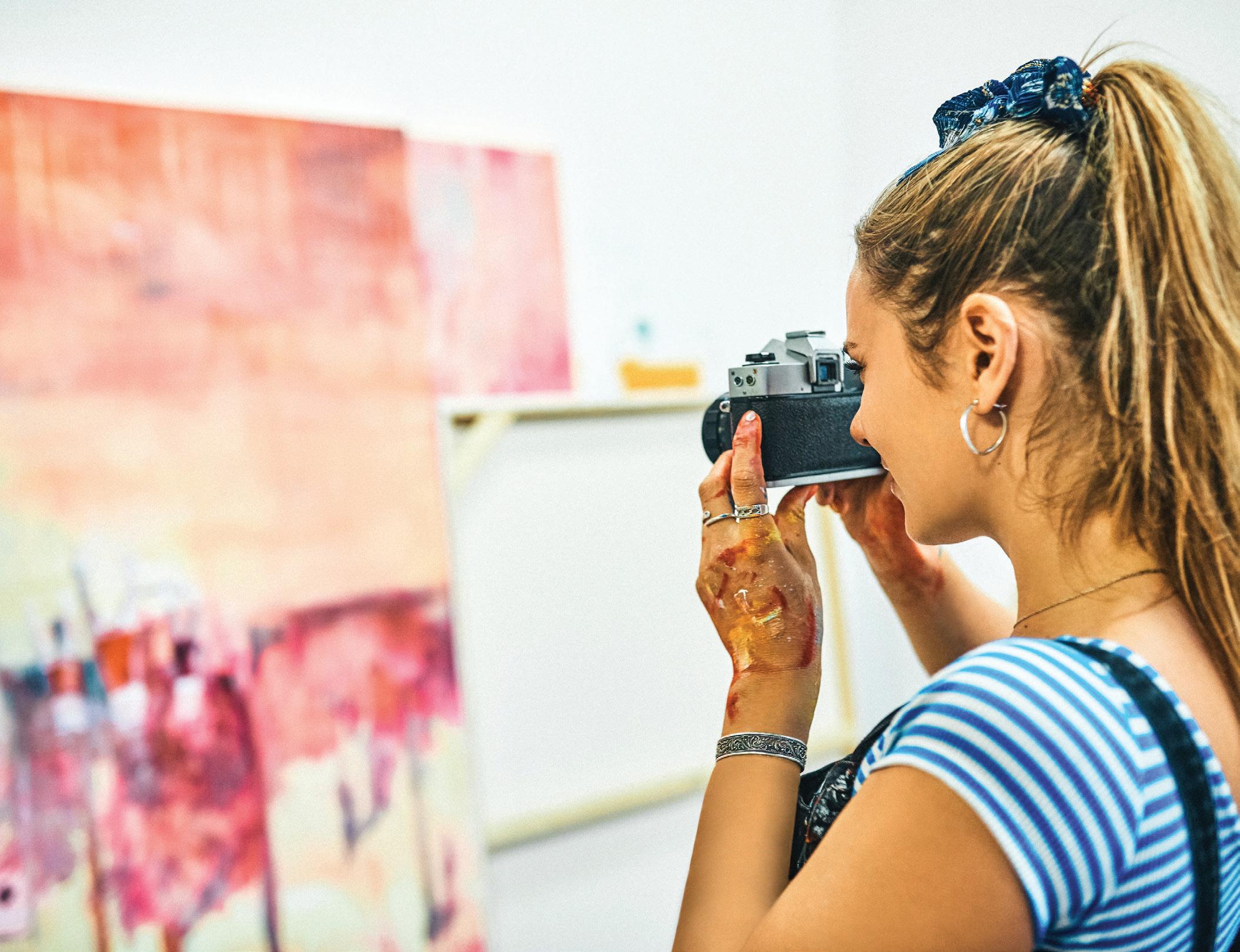
ortfolios are a curated collection of your best work, showcasing your skills, experience, and talents. Whether you hope to become an actor, visual artist, or other creative professional, you’ll need a portfolio to apply to college. This tool can capture the admissions committee’s attention, showcase your abilities, and elevate yourself above the competition.
When organizing your portfolio, think of it as telling your artistic story. Arrange your work to show your growth and unique style. Aspiring actors should include a professional headshot capturing their personality, an acting resume highlighting relevant experience and skills, and a demo reel featuring their best on-camera work. Visual artists should highlight 12-20 of their strongest pieces, a range of skills and mediums, and their ability to solve creative problems.
As you begin to research colleges with the performing or visual arts major you’d like to study, keep these tips in mind:
• Start early: Begin collecting your best work as soon as possible, ideally from 9th grade onward.
• Quality over quantity: Choose the best pieces to showcase your skills, flair, and creativity.
• Show range: Include works demonstrating different techniques, styles, and mediums.
• Highlight growth: Organize your portfolio to show your artistic development over time.
• Follow guidelines: Carefully read and adhere to each college’s specific portfolio requirements.
• Get feedback: Ask teachers, mentors, or professionals in your field to review your portfolio.
• Include a statement: Write a brief artist’s statement explaining your passion, drive, and creative process.
• Keep it current: Update your portfolio regularly with your latest and best work.
• Be authentic: Let your unique voice and style shine through in your selections.
“Each program looks for different things in a portfolio, so read the application carefully! In general, professors expect portfolios to showcase the best representation of you as an artist. Programs often ask for at least one fully developed project showing how you explored an idea over time to see the breadth and depth of your practice,” said Lauren Onkey, director of the Corcoran School of the Arts and Design at George Washington University. “The most important thing is to present what you feel is your strongest work within your most recent projects,” she said.
Remember: your portfolio reflects you as an artist. Make it engaging, professional, and true to your vision. A strong portfolio positions you well to impress admissions committees and take that first step toward a career in the performing or visual arts.

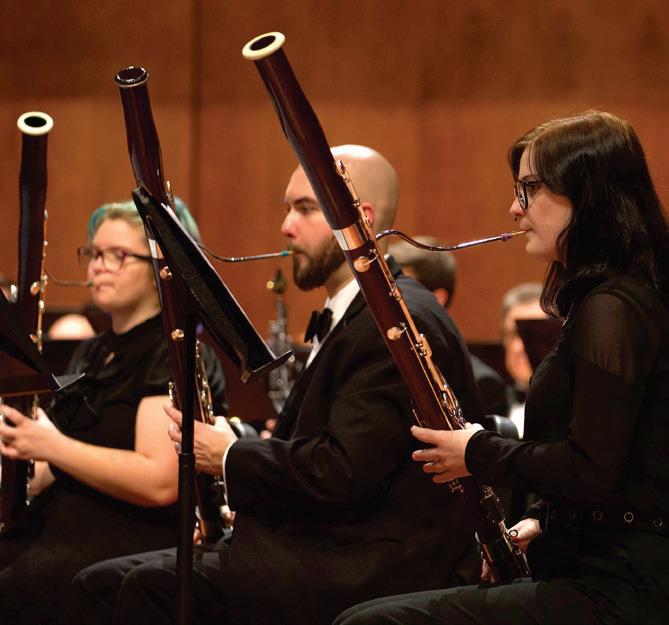
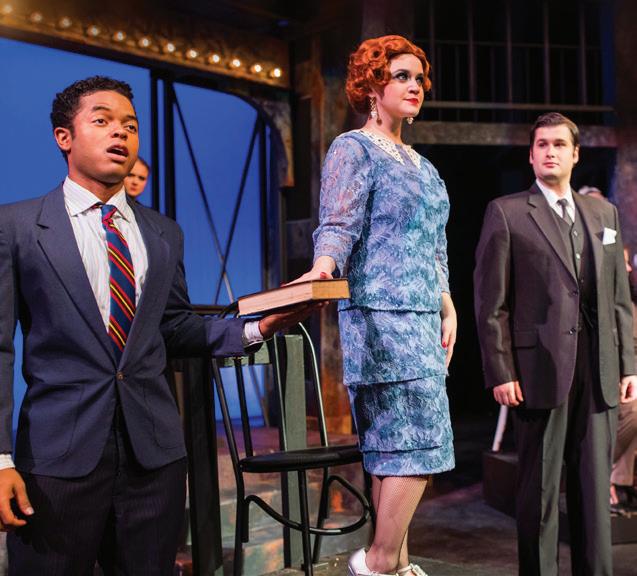

DEPARTMENT OF MUSIC
COMMERCIAL MUSIC (B.M.)
MUSIC (B.A.)
MUSIC EDUCATION (B.M.)
MUSIC PERFORMANCE (B.M.)
MUSIC THERAPY (B.M.)
SACRED MUSIC (B.M.)
DEPARTMENT OF THEATRE & DANCE
ACTING (B.F.A.)
DANCE - INTEGRATED DANCE STUDIES (B.A.)
DANCE - PRE-DANCE/ MOVEMENT THERAPY (B.A.)
DANCE CHOREOGRAPHY (B.F.A.)
DANCE EDUCATION (B.A.)
DANCE PERFORMANCE (B.F.A.)
THEATRE - MUSICAL THEATRE (B.A. & B.F.A.)
THEATRE ARTS (B.A.)
THEATRE BUSINESS (B.A.)
THEATRE DESIGN AND TECHNOLOGY (B.F.A.)
THEATRE PERFORMANCE (B.A.)
DEPARTMENT OF ART & DESIGN
ART EDUCATION (B.A.)
ART HISTORY (B.A.)
ART THERAPYSPECIALIZATION IN COUNSELING (M.A.)
FINE ART STUDIO (B.F.A.)
GRAPHIC & INTERACTIVE DESIGN (B.F.A.)
PRE-ART THERAPY (B.A.)
STUDIO ART (B.A.)

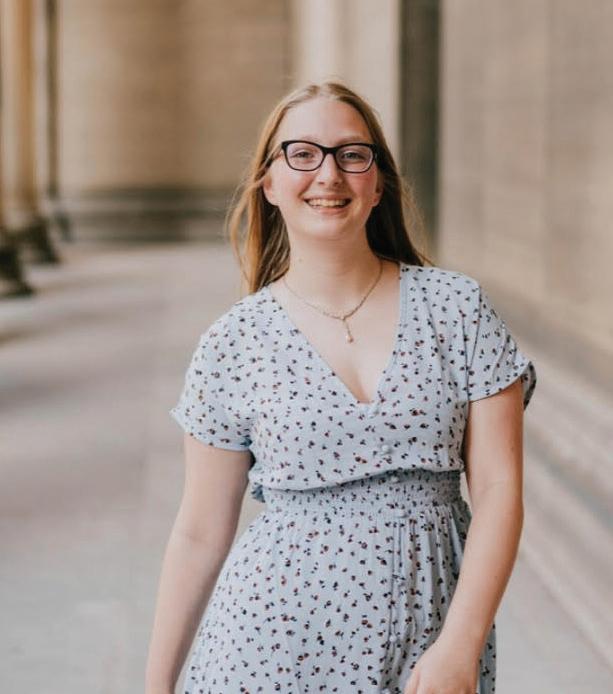
Why did you choose to attend this college and select this major?
During my college application process, I had a friend who was attending Seton Hill University as a sophomore. He really encouraged me to tour and audition for Seton Hill, which I did a few months later. I still remember the exact day I toured: February 25, 2022. Between the tour guides and faculty I met, I instantly felt very comfortable and welcomed as opposed to the other schools I visited, where I only met the guide. I had a decision from them that day on whether I had been accepted or not, and it became one of my top choices right away.
Theatre has always been a huge part of my life. I’ve participated in camps, taken classes, and pretty much everything drama and music-related in school. I’ve always done it, so it was an easy decision to make when asked what I wanted to do. I’ve always appreciated that I found my passion at a young age. Not many people can say that, so with the degree, I want to go into the teaching of theatre to be that kind of starting point for some people.
What did you hope to get out of the program, and did you achieve it?
Besides gaining a basic education, I really want to broaden my appreciation for theatre and the world in general. The classes truly do allow for that exploration here. Between the liberal arts curriculum and the variety of theatre-specific courses, I believe I've already achieved my goal. I’m just a junior, but I understand and value so much more now than I did coming in.
Did you have to prepare for this major in any way?
If you didn't, do you wish you did?
I’ve been doing theatre from a young age. I’ve participated in summer camps, weekend classes, etc. Those really helped me prepare for what a theatre-intense world would be like. Besides that, I spent a lot of time working on my audition material both for college auditions and professional auditions. Theatre is a very different world from most majors, so preparation is everything. Everything I did had led up to and prepared me for my time at university. If I could do one thing differently, it’d be to take more opportunities, which would allow me to prepare.
What was a typical day like?
It really depends on the day. Most of the time, I keep my schedule back-to-back, just because that’s how I prefer it. Most theatre classes are only 90 minutes (give or take), and a lot of them are spaced out, so in the times when I have a big gap between my classes, I'm usually working at one of my jobs (either with the Griffin Guides - Seton Hill's Campus Tour Guidesor in the Scene Shop). The evening also depends on what shows are happening, when rehearsals are, events on campus, etc. In short, it’s never a dull moment.
What was the most memorable moment of your time at this college?
I think that would have to be doing the student-run shows that we do every year through our Student Theatre Activities Council (STAC). It’s a great opportunity to work with peers and create something that is completely your own. Everything is studentrun, from the set design to directing to creating the choreography (if needed), etc. It’s really just a great experience and I look forward to it every year and always recommend it to new students, theatre majors or not.
One of the most comprehensive schools for arts, culture and design in Canada, located in Toronto.


Realize your creative potential at AMPD, a dynamic hub for creative experimentation and expression.
Apply before February 5 to start in September 2025. ampd.yorku.ca/join
Learn more:

Cinema & Media Arts (BA)
Cinema & Media Arts
– Media Arts (BFA)
– Production (BFA) – Screenwriting (BFA)

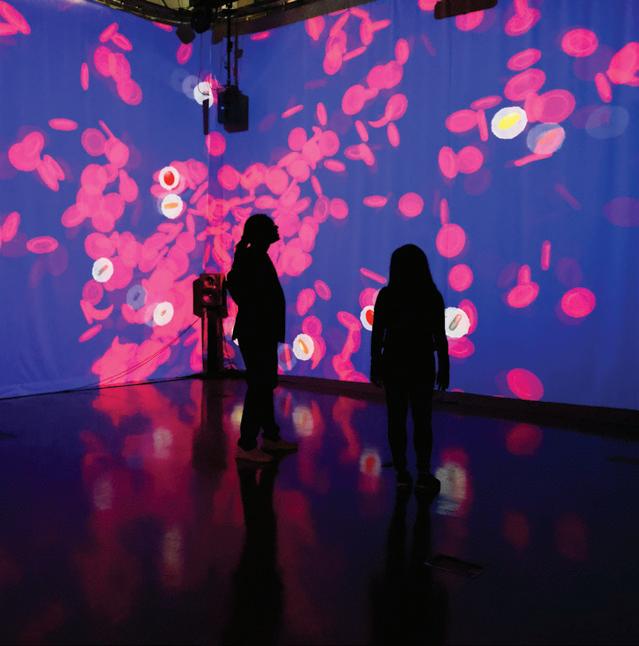
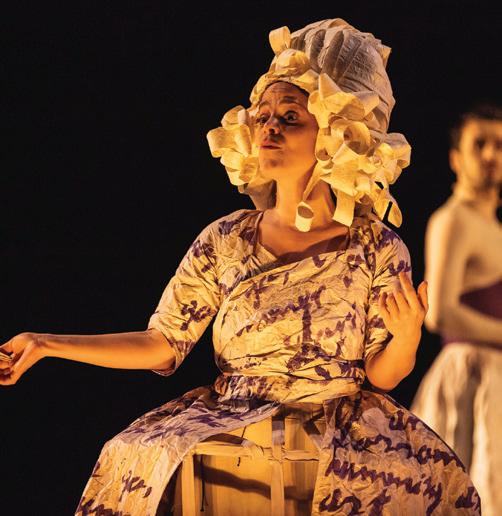
Creative Technologies (BFA)
Dance (BFA)
Design (BDes)
Digital Media (BA)
Integrative Arts (BFA)
Music (BFA | BA)
Theatre (BA | BFA)
Visual Arts – Art History (BA)
Visual Arts – Studio (BFA)

he intersection of art and technology has generated a dynamic, innovative landscape. Technology has also transformed the production, distribution, and consumption of art, found inspiration in its aesthetic and conceptual realms, and enhanced its accessibility.
“Without audio, cameras, and lighting — that is, the technical side of the industry — you wouldn’t be able to hear, see, or enjoy most of the arts,” said Carma DiCianni, director of student operations and marketing at The Blackbird Academy. “Audio engineers are everywhere you hear sound, from churches and casinos to cruise lines and sporting events, not just theater!
“As the director of an audio school, I notice people sometimes forget that without the audio engineer, concert hall music, voices and sound effects in your favorite TV show or movie, a new album you love, and even a night at the theater wouldn’t sound right,” said DiCianni. “Wherever there’s sound, an audio engineer worked to make it a more enjoyable experience.”
But the arts, audio/video, and communications industries don’t just include audio engineers. These careers encompass so much more, like jobs in designing, producing, exhibiting, performing, writing, and publishing multimedia content. The visual and performing arts, journalism, and entertainment services (to name a few) all rely on technology for proper execution — and satisfied audiences.
If you’re curious about the careers that bridge art and design skills with technology, here are just a few:
• Fashion designer
• Film & video editor
• Graphic designer
• Medical illustrator/animator
• Multimedia artist/animator
• Sound or audio engineer
• Web designer
• Video game designer/programmer
The boundaries between science and art have become increasingly blurred in today's technology-driven world. Once seen as distinct disciplines, these fields intersect across many areas, including
architecture, industrial design, illustration, photography, and user experience (UX). And the skills benefiting people in every industry often combine computer science and art.
Traditionally, artists have relied on physical materials like pencils, paints, and clay to create their work, but the digital age has introduced a vast array of tools and techniques to expand creative possibilities within the visual arts. Recent research has shown that the job market for digital artists is growing. Of the 75,000 artist jobs listed on LinkedIn, about 65% of the highest-paying artist positions are within the IT sector, with graphics-related roles particularly prominent.
The Pew Research Center has also noted a trend in Americans’ increased preference for using digital platforms to access information and the news, necessitating a shift in how artists and designers reach audiences. Thus, colleges are incorporating classes to ensure their students gain proficiency in digital platforms and software to prepare them for careers in advertising, media production, and graphic design.
Some colleges have created majors blending code, art, and design, teaching students how to push the boundaries of visual expression by using programming languages and developing interactive projects. This approach empowers them to explore software as a dynamic medium. It prepares them for careers in game and app development, interactive design, data visualization, and emerging roles where creativity and technology intersect.
Are you curious to explore other careers that overlap the visual arts and computer science? Check out these resources:
• Abstract: The Art of Design (Netflix series). This captivating series explores the creative processes of some of the world’s most influential designers. Each episode focuses on a different design discipline, providing viewers with an intimate look into the minds and methods of these creative visionaries.
The series shares details about designers’ inspirations, challenges, and philosophies. From the raw conceptualization of an idea to its final execution, viewers witness the intricate details and passion driving these individuals.
Designers featured in the series include Paula Scher (graphic design), Bjarke Ingels (architecture), Rafael Esquerra (interaction design), and Christoph Niemann (illustration). The design disciplines featured also include fashion and product design and typography.
• The Art Career Project (A creative community for makers/creators/emerging artists). This comprehensive online platform supports and empowers emerging artists and innovative individuals. Its primary mission? To bridge the gap between artistic passion and professional success.
It offers a range of features, including a network of artists who collaborate and share knowledge and inspiration. You can find indepth career guides exploring different artistic paths and practical advice on building a sustainable art career. It includes free, expertcurated content, including tutorials, workshops, and articles on art techniques, business skills, and industry trends. The site also helps artists find scholarships, grants, and other financial support for their education and projects.
• The Cool Jobs Show (YouTube series). This series gives viewers a glimpse into the exciting and often unconventional world of work. Its primary focus is to highlight unique and interesting job profiles, challenging the traditional notion of what constitutes a “regular” job.
Job profiles the series explores include digital artists and illustrators, motion graphics designers, UX/UI designers, virtual and augmented reality developers, and game developers. The show hopes to inspire viewers to explore careers at the intersection of art and technology by showcasing the creative and technical skills required for these professions.
• 1, 2, 3, 4 and 6-week programs
• Credit and Noncredit courses
• Explore potential careers and college majors
• Build a resume and/or portfolio
• Make new friends from around the world
• Stand out to college admissions

• Architecture
• Art in L.A.
• Experimental Drawing
• Fashion & Accessory Design
• Filmmaking
• Graphic Design

• Musical Theater
• Observational Drawing
• Painting Studio
• Photography
• Sound Engineering and Audio Production
• And more!
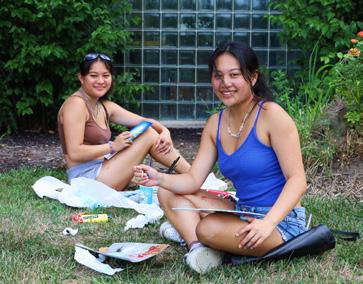
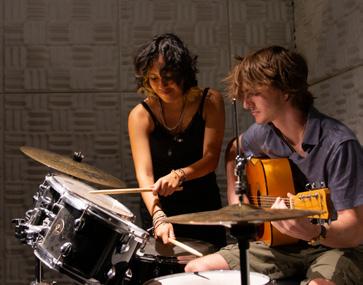
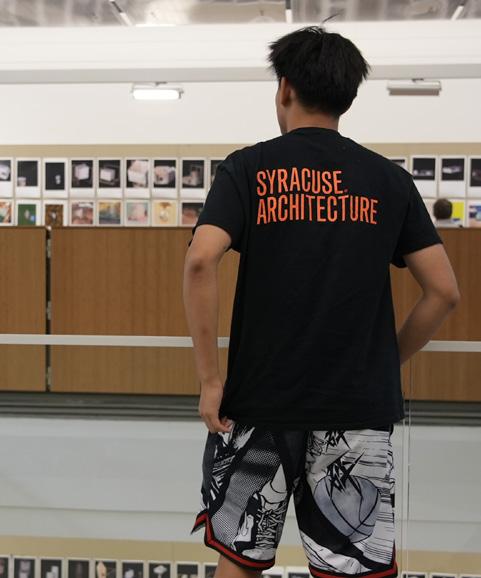

f you’re dreaming of a career in the visual or performing arts, earning scholarships can help turn that dream into reality. These awards offer financial support, recognition, and invaluable networking opportunities. Many merit and need-based scholarships are available.
This list includes just a smattering of the many different available scholarships. We opted not to include ones that are region-specific, nor does this list include scholarships and grants offered by specific colleges or universities.
Because some applications require the submission of a portfolio or video showcasing your work, we recommend reviewing this list and creating a spreadsheet to help you track app requirements and deadlines. Please visit our full blog, which offers additional tips to finding and applying for other financial aid (including grants and scholarships) to help fund your college journey.

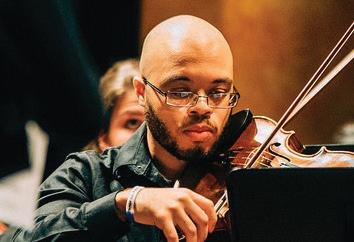
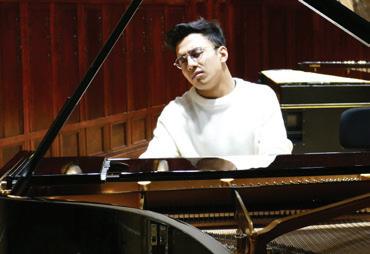


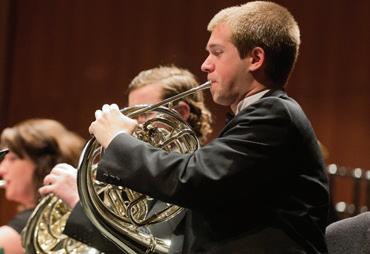
Bachelor of Arts in Music
Double Major with Music
Bachelor of Music Education
Bachelor of Music in Performance
For Open House and Audition dates, go to: www.gettysburg.edu/music I www.gettysburg.edu/music

• Andy and Julie Plata Honorary Scholarship
• Creative Innovation in Education Scholarship
• Greater Than Gatsby Annual Scholarship
• FSF Case Study Scholarship
• Gucci Changemakers Scholarship Program
• International Furnishings and Design Association Scholarships
• The James Alan Cox Foundation Grant
• Janie Moore Greene Scholarship Grant
• Ocean Awareness Art Contest
• Photo Contents Guru Fine Art Photography Grants and Awards
• WomenArts Visual Arts Scholarships
• Young American Creative Patriotic Art Contest
• Broadway World Theatre Scholarships
• The Cody Renard Richard Scholarship Program
• The Directors Company Awards and Scholarships
• Educational Theatre Association Scholarships and Grants
• Irene Ryan Acting Scholarship
• NSHSS Performing Arts: Theatre Scholarship
• Brown Girls Do Ballet Scholarship
• Cyril McNiff Memorial Scholarship Program
• Dance Educators of America (DEA) Scholarships
• Gene Kelly Legacy Scholarship
• Joan Meyers Brown Equity Scholarship Fund
• New York City Dance Alliance Scholarship Program
• Ruth Abernathy Presidential Scholarship
• Share the Movement Scholarships
• YoungArts Dance Scholarship
• Yvonne Brown Collodi College Scholarship
• Against the Grain Scholarships
• ASCAP Foundation Scholarships
• BMI Foundation Scholarships
• Daughters of the American Revolution Scholarships
• Dr. Robert Hawkins Memorial Scholarship
• Glenn Miller Birthplace Society Music Scholarship Competition
• Hartford Jazz Society Scholarship
• Jack Kent Cooke Young Artist Award
• Jim Ott Scholarship
• Lamond Gennext Award
• Lessons in Your Home Scholarship
• MAJORINGinMUSIC - scholarships for music majors
• Marshall and Dorothy Smith Music Scholarship
• Musical America Worldwide Scholarships
• National Association for Music Education Scholarships
• National Federation of Music Clubs Competitions
ANY VISUAL OR PERFORMING ARTS MAJOR
• Against the Grain Productions Artistic Scholarships
• The Classic Center Scholarships
• The Giving Back Fund: Legacy Lab Foundation Scholarship
• National YoungArts Foundation
• NSHSS Scholarships
• Princess Grace Foundation Awards
• The Ralph J. Torraco Fine Arts Scholarship
VISIT OUR BLOG TO SEE THE FULL LIST!

Dean College:
Why Did You Choose to Attend Dean College and Select This Major?
I grew up in a family of performers from dancers to figure skaters and at an early age you could find me dancing. I never missed an opportunity to perform, and I loved it. It wasn’t long before I fell in love with singing and musical theatre. It was then that I knew that I wanted to be a performer when I grew up. When it came time to look at colleges, I knew I wanted to combine my two passions – dance and theatre. Many schools discouraged pursuing both majors, but Dean College not only supported the idea but had students who were doing the same thing. After meeting those students, I knew Dean was the place for me. Dean gave me the freedom to pursue my passions and supplied me with the tools I need to reach my dreams.
What Did You Hope to Get Out of the Program, and Did you Achieve It?
I knew I wanted to be surrounded by like-minded, driven performers like myself. I want to be in an environment where I would be pushed by the talent around me so that I could be the best performer possible. This environment would not only push me to be the best but encourage others to be their best. We are able to grow collectively and do something special together.
Did You Have To Prepare for This Major in Any Way?
Because I grew up in a family of performers, I’ve been training for my major my whole life. Early on I took dance lessons in styles like tap, jazz, ballet and acro. Then, in middle school I started in theatre, getting more comfortable performing. By the time I was in high school, my training became more serious at the Palace Theatre in Manchester, NH. There I was surrounded by incredible talent and teachers who had success at the highest level, including on Broadway. I participated in semester-long intensives and performed in productions put on by Palace’s artistic director and visiting artists.
What Was a Typical Day
A typical day starts with getting my body and mind ready for the day. Most days I start with stretching routines, yoga and goal setting. Then I’m off to class. I take a mix of general education classes that give me a holistic education and theatre classes that hone my skills. From there, I’m off to rehearsals for my current project or show. And, of course, I carve out time for friends and participating in clubs like Speakeasies, Dean’s improv group.
What Was the Most Memorable Moment of Your Time at Dean College?
Outside of growing as a performer, I love championing my peers. One of my closest friends had written a play, something he’d spent years working on. When he shared it with me, it became one of the best things I’d ever read. He asked if I’d be willing to play the lead. I obviously said yes and even offered to help him produce the show. In no time we put together a team to get the production off the ground and ready for the stage.
Your college choice will be your home for the next four years, so you need to make sure you find a place that feels like home. Sure, you need to make sure the school has the right major, resources, and support, but more importantly, it needs to feel like home and has a community where you fit.
You’ll Gain More Than Performance Skills!
oyou’re passionate about theater and want to study it in college? That’s fantastic! But maybe your parents — or others — worry that a theater degree isn’t practical.
But here’s the truth: theater teaches valuable skills you’ll use on and off stage, and these skills will benefit you whether you perform on Broadway, teach in a classroom, advocate for clients in a courtroom, or present your ideas in a conference room.
Earning a bachelor’s degree in theater entails much more than memorizing lines and performing. You learn a host of soft skills that future employers will value and often prioritize over technical skills, which are sometimes easier to learn on the job.
Want to strengthen your case for why a theater degree is the right path for you? Check out these other vital skills critical for success.
•Communication: When you’re an actor, communication is everything. You can’t just recite your lines — you have to listen to what the other actors are giving to you and pick up on their unspoken cues and body language. Then, you must adapt your delivery to match the vibe of that specific scene and role.
Theater classes will turn you into a master of reading between the lines and tailoring your communication style to connect with different people in different situations. Whether you’re projecting your voice to captivate an entire auditorium or articulating your thoughts in a more intimate setting, you’ll build your confidence in public speaking.
The ability to command attention and get your point across is a game-changer. It’ll help you nail job interviews, work presentations… you name it! If you can own the stage before a packed theater, addressing other audiences is a breeze.
•Creative problem-solving (under pressure): Theater is all about thinking on your feet when things go wrong — and they will go wrong. Prop malfunction before curtain call? You have to troubleshoot immediately without losing your cool. Forgot your line mid-scene? Despite the adrenaline rush, you have to recover and get back on track.
Long tech nights, tiny budgets, and weird snafus happen. Theater keeps you on your toes and forces you to make smart decisions in high-pressure situations.
Acting, directing the chaos, or working crew gives you a crash course in evaluating situations with a clear head and figuring out resourceful solutions — fast. You roll with the punches, think outside the box, and stay calm when everything else is falling apart around you. Talk about a clutch skill for any future career!
•Productivity: Theater majors have schedules that don’t quit. Endless rehearsals, regular classes, social lives, and part-time jobs pull you in a million different directions. But you’ll become exceptionally good at prioritizing tasks, managing all commitments, and hitting deadlines — no excuses. Procrastinating isn’t an option when you're juggling that many balls.
By graduation, the ability to meticulously plan your days and strike a work-life balance will
become second nature. It’s a talent sure to impress any future employer. After handling the theater's bedlam, balancing the demands of a 9-5? No sweat.
• Teamwork: Every theater production is a team effort dependent on collaboration among actors, directors, designers, and technicians. You’ll learn respect for everyone’s contributions and how to communicate effectively within a team and work toward a common goal.
Ultimately, you’re striving for the same goal: putting on an amazing show. Getting practice buying into the team spirit and putting egos aside for the greater good? Priceless.
• Independent work: While theater is a team sport, you’ll learn to operate independently, too. You’ll have tasks to complete without supervision — designing a set or tweaking choreography outside of rehearsal.
Figuring out how to fix issues, manage your workload, problem solve, and meet deadlines without someone cracking the whip? All fields prize self-motivated hustle. Employers want people who can run projects independently and do things efficiently (and correctly) without constant oversight. Theater will mold you into that self-driven A-player making things happen.
• Leadership: You can’t be a solo act in the theater. Many roles involve taking charge. You’ll delegate tasks, motivate others, and provide constructive feedback, getting everyone working together toward a shared vision.
Gaining experience taking the reins and guiding others to bring a play to life? That’s some seriously valuable leadership training. Those skills are game-changers for thriving in any professional environment. From running meetings to managing entire projects and teams, you’ll feel confident stepping up and steering things in the right direction.
• Self-confidence: There’s no bigger confidence booster than stepping onto a stage and commanding an audience’s attention. You’ll learn to overcome fear, embrace vulnerability, and trust yourself. After a few curtain calls, putting yourself out there becomes second nature, and you’ll feel like you can conquer anything.
That self-assurance will radiate into every aspect of your life. Feeling comfortable speaking up in meetings and sharing your ideas? Taking the lead on projects that intimidated you before? Going after new challenges? You got this.
• Critical thinking: Theater training requires you to analyze scripts, interpret characters, and understand a play’s deeper meaning. You’ll learn to analyze information objectively, identify underlying issues, and form well-reasoned arguments to support your opinion or gain buy-in from others.
From boardrooms to courtrooms, an advanced capacity for critical thinking and persuasion separates stellar professionals from everyone else.
• Empathy and emotional intelligence: Acting requires stepping into the lives of different characters, understanding their emotions, and feeling what they feel. Learning to do this will help you develop a crazy amount of empathy.
You’ll learn to recognize and connect with all the emotions people experience. Emotional intelligence is valuable whether you’re vibing with your classmates or connecting deeply with audiences. And it’s not just for theater. Every field benefits from having employees who “get” people on a deeper level.
• Resilience: In theater you face lots of rejection. You might nail an audition and still not get the part. All the work and dedication can’t always help a production that’s run off the rails. But theater teaches you to take those setbacks in stride. Make a mistake? It happens! Pick yourself up, learn from it, and keep pushing forward with a positive mindset.
Building resilience comes with the territory in the theater. It’s an incredibly valuable skill to have regardless of your career journey. Adapting and overcoming obstacles or changes thrown your way separates those who thrive from those who don’t.
• Research skills: Bringing a character or play to life requires more than line memorization. You’ve got to sift through dozens of sources to gather the facts to understand who these people were and what was happening in their world — and then analyze that raw information and piece it together to inform your creative choices on stage.
Whether you’re researching medieval norms of a Shakespeare production or studying psychological profiles to nail a complex modern role, you’ll develop serious research chops. By the time you graduate, you’ll be a pro in finding credible information and synthesizing it to elevate your craft — a handy skill for any career requiring in-depth knowledge (and the know-how to develop that wisdom).

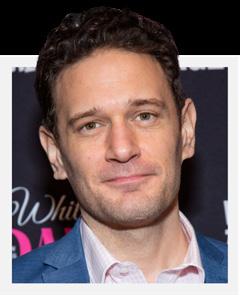


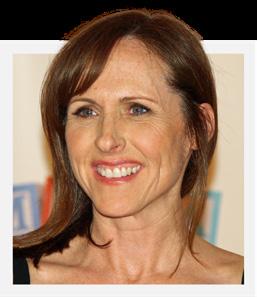







Theater kids are a different breed. While regular people scratch their heads, wondering how you find "fun" in the grind, you already know the secret. Sure, the schedule’s insane, with late nights, endless rehearsals, and zero social life. But you’ve learned to find genuine enjoyment and fulfillment in the hustle. And bonus: your theater degree low-key equips you with a full supply of skills for success in any field.
Yes, you'll come out prepared for life on the stage if that's your goal. But the not-so-secret truth? Theater basically transforms you into an employer's dream hire for just about any role. You'll graduate with a stacked resume of relatable, transferable skills that give you a huge leg up, no matter what you do after graduation.
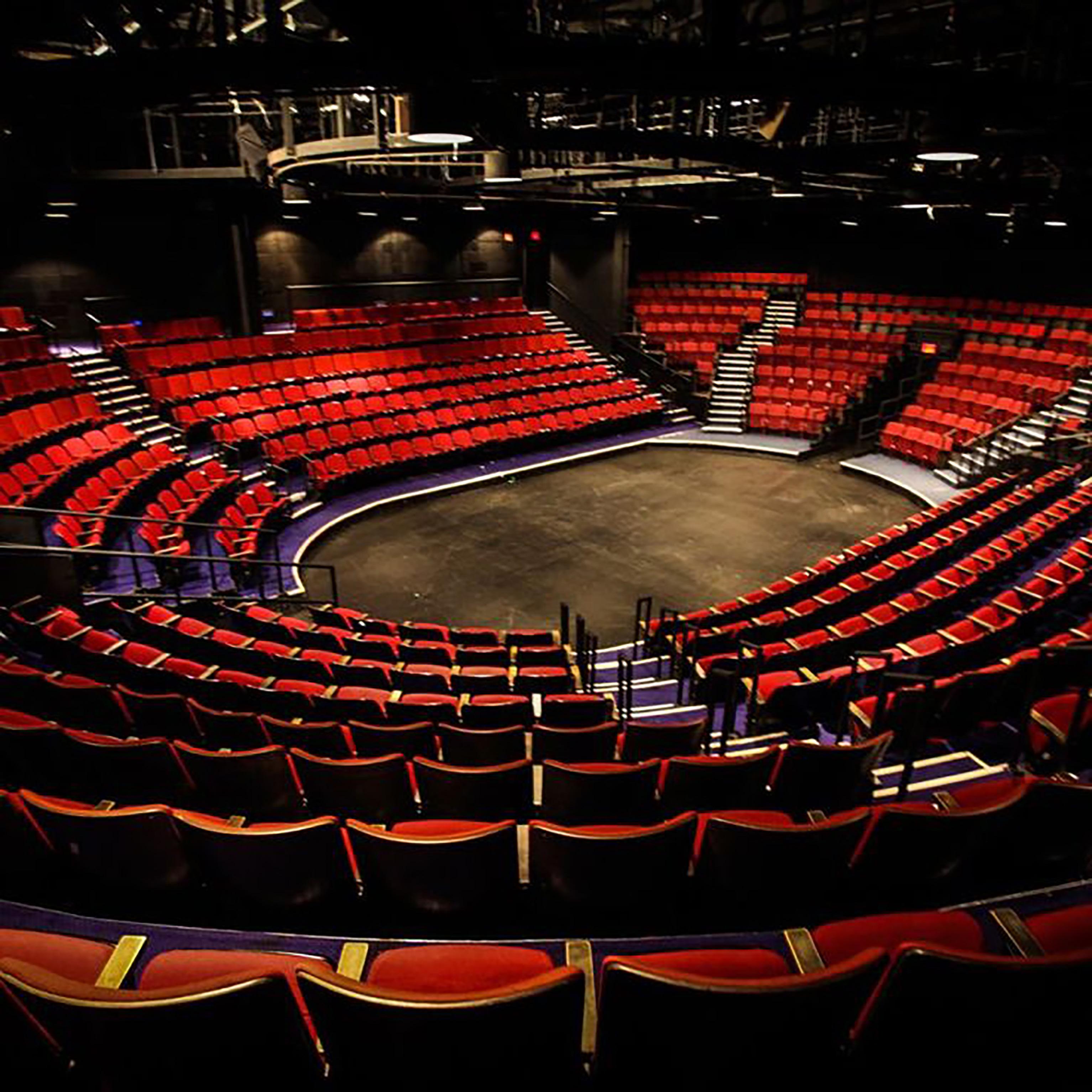
The key is recognizing those competitive advantages you’ve built — and then shouting them from the rooftops to potential employers. Show them how your theater background separates you from the pack.



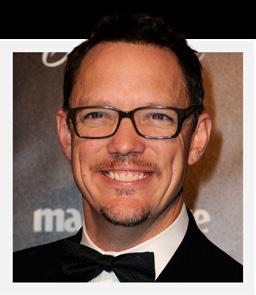





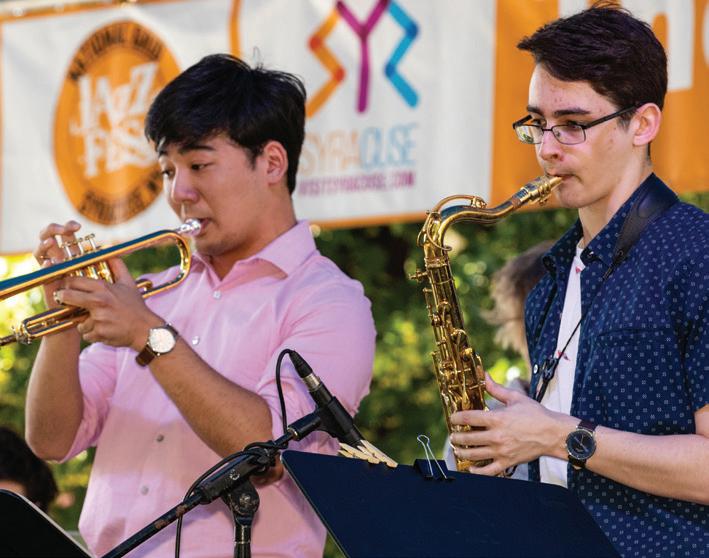

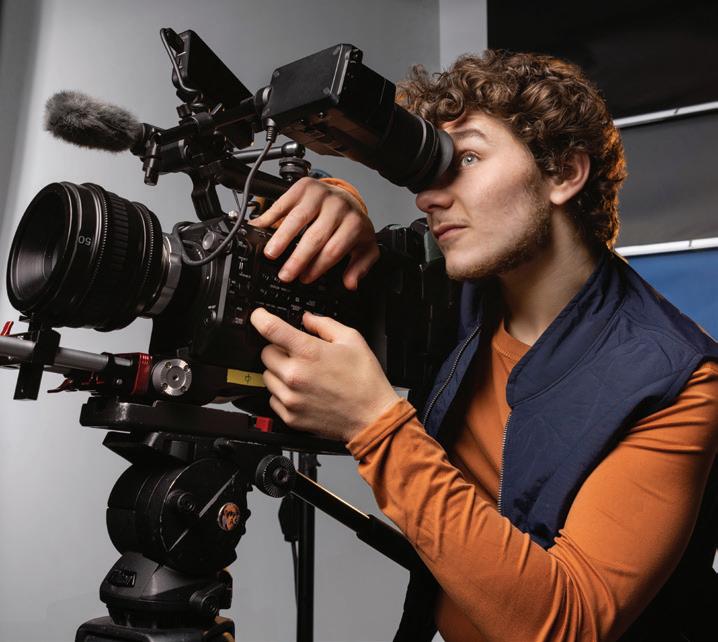

Imagine yourself as part of our creative, innovative community of artists and scholars. Our programs span the disciplines of art, design, film and media arts, drama, music, and communication and rhetorical studies. Add the benefits of career advising, alumni mentorship, and study abroad/study away opportunities, and it’s easy to see why the College of Visual and Performing Arts is the right choice for you.
vpa.syr.edu 315.443.2769 admissu@syr.edu

using what I learned in lectures and live band rehearsals at The Blackbird Academy, I was able to go out and start working immediately, no matter what equipment I was given. I have been hired by and worked with other Blackbird graduates in the past several years and we are developing an incredible network of engineers and audio professionals across the nation. I would highly recommend anyone that wants to have a great career in audio to come be part of the Blackbird family!
There are so many opportunities for someone in live sound. Many people think it is just touring but it is not. I have friends and classmates who are front of house engineers, monitor engineers, systems engineers and even guitar or drum technicians who have gone on and had wonderful careers in churches, amusement parks, casinos, cruise lines, sporting venues and other large venues. There are many great careers, and not all require travel, which isn't for everyone — although some of us love it. The Blackbird Academy has an amazing placement department; they currently place 95% of the Live Sound graduates and 70% of the Studio graduates. Plus, they will work with you forever.
I graduated from The Blackbird Academy in June of 2015. Thanks to the education and connections I had received in this program, I began touring even prior to graduating. Since graduating, I have mixed for Aubrie Sellers, Sturgill Simpson, Raelynn, and I am currently mixing FOH (Front of House) for Kane Brown. By
I chose The Blackbird Academy because it offered a hands-on educational experience; it was the only place industry professionals recommended. A typical Academy day mirrored typical industry days: full-time, working with artists, and learning the gear. Students get 720+ hours of hands-on training in the Live Sound Program's classrooms, rehearsal spaces, and labs. Classes meet five days a week for 30-40 hours total. You can access individual workstations with Focusrite RdNet X2P with Dante and ProTools and audio labs and equipment outside regular hours for working on assignments or practicing recording and mixing. You'll work alongside industry professionals and special guest mentors in the classroom, live rehearsals, and training events. You'll also make on-site visits to Nashville live venues, broadcast outlets, and other audio-related businesses.


You’ve earned a B.A. and M.A. and almost finished your doctorate in art history. What about this topic inspired you to make a career in it? I was always interested in the arts, and as a teen, my parents encouraged me to follow this passion. I did a pre-college program at VCUarts (Virginia Commonwealth University School of the Arts), which I loved. It was perfect for younger high schoolers. The next summer, I did a four-week MICA (Maryland Institute College of Art) pre-college program in Baltimore. I chose digital photography as my primary concentration, plus a book arts elective and a curatorial requirement. Most of the time, I found the lectures dry, as most 15-year-olds forced to spend a summer afternoon in a dark auditorium might. But to earn the four college credits, I had to complete a final curatorial project. I spent the last weekend of the program working on it and completely fell in love with the prompt: Propose any exhibition. It was very open-ended. I researched other exhibitions and fell in love with the idea of curating because it allows you to be creative but with a structured career path.
The next summer, before my senior year of high school, I completed a pre-college program at Brown and took my first art history class. I’d never taken a class in art history before, and the more I learned, the more I loved it. I was lucky to figure out what I wanted to do while I was still in high school.
I earned my undergraduate and master’s degrees in art history at Bryn Mawr College. Now, I’m almost finished with my Ph.D. My dissertation focuses on material culture and digital media and how artists use digital production and circulation to make art more accessible.

What advice would you give HS students considering a career in the visual arts?
Pursue what drives you. In high school, I felt more excited about designing costumes in technical theatre than I did for my math and science classes. I stretched myself to do many different things, and that helped me organize my time. I took art classes, taught art to students in the Best Buddies program, and was a Girl Scout. I learned to multitask in high school — a skill I use every day now.
What advice would you give HS students interested in an art history major?
It’s a great field of study that teaches you about the world — politics, culture, change, critical theory, how to look at things, and why we look at things. It is a very competitive field, and many of my classmates have pursued careers outside of curatorial work. It can be a practical, grounding degree; you can always study something else alongside it.
What are some typical career paths for art historians?
Traditionally, these careers are in museums, galleries, cultural institutions, or education. There are many departments at an art museum: marketing, development, registration, preparation, education, and curatorial. To become a museum curator or professor, one would need a Master’s degree and, ideally, a Doctorate. Many art history undergraduate majors pivot to something seemingly completely different, like law. Others work in publishing, book design, arts and illustration, or administration.
ummer break isn’t just a time to unwind — it’s a golden opportunity for unique experiences and personal (and academic) growth. Performing and visual arts-related summer programs for middle and high school students open doors for participants to explore their interests more fully, develop new skills, and gain experiences far beyond the classroom.
Many summer programs provide intensive training in specific subjects like art, music, theater, or design.
Whether the arts is going to be your college major or your intended profession, it benefits everyone to have experience across various mediums to learn how creativity is an important tool and resource,” said Lizzy Plapinger, co-founder, Neon Gold Records and academic advisor, NSLC. “Attending a summer arts program is an amazing opportunity for expressing yourself and communicating in more non-traditional ways.
Curious about a specific college or university?
Check out its summer programs. Many institutions host programs offering a glimpse into what it’s like to go there. You’ll experience the campus facilities, meet faculty, and get a taste of college life. This opportunity is invaluable for high school students deciding whether a specific college or university fits their academic and artistic goals.
A summer theater or music program could expose you to campus life and the faculty’s expertise and teaching styles. You’ll practice in the college’s music rooms, performance spaces, and recording studios, giving you a firsthand look at its resources.
Arts-related summer programs often culminate with a final performance, exhibition, or creative project. These intensive projects push you to create new pieces showcasing your growth and current artistic level. It’s the perfect opportunity to add this valuable material to your college application portfolio.
You might take a visual arts class where your instructor encourages you to experiment with new media and techniques. Perhaps you’ll play with different artistic styles and try out a new voice in your work. Many programs also offer curated project guidance, providing a framework for your artwork; teachers mentor participants, helping them develop a cohesive body of work that tells a story.
You may even find a summer program where the college faculty or admissions staff offers recommendations and feedback to help you build a portfolio with your strongest pieces to showcase your talents.
Many summer programs are located overseas. You might travel abroad to learn about your chosen art form in its birthplace and get a lesson from the masters.
Annie L. participated in one of CIEE Global Navigator High School Summer Abroad programs: Connecting Italian Art, History & Culture in Rome, Italy. She said, “As we learned about the techniques of art in class and the history of Rome, we were able to experience both first hand. There are not enough words to describe how amazing and transforming this experience was.”
Ella K. traveled to London for CIEE Global Navigator High School Summer Abroad: Theatre Arts on London’s Stage. She said, “ I learned so much about theater, and my love for it grew. You also get to travel and make friends with people who have the same interests and passions as you. It’s so much fun."
Wherever you go, you’ll be in good company among others who share your passions. This diverse group will become your artistic community, pushing you to think outside the box. You’ll inspire each other, and by the end of the program, you’ll approach your art with a sharper focus, surge of
motivation, and perhaps even a clearer vision for your future.
The top marketable soft skills hiring managers look for in their candidates include communication, such as listening, negotiating, speaking, and writing. Also key? Leadership, especially the ability to give and receive feedback, and teamwork (which also relies on good communication skills, responsibility, and collaboration).
In addition to these skills, a summer arts program also reinforces your self-management and motivation, solid time management, organizational, and problem-solving skills. Even if you don’t choose an arts major, the skills you’ll learn are in high demand by today’s employers and will hold you in good stead no matter what career path you choose.
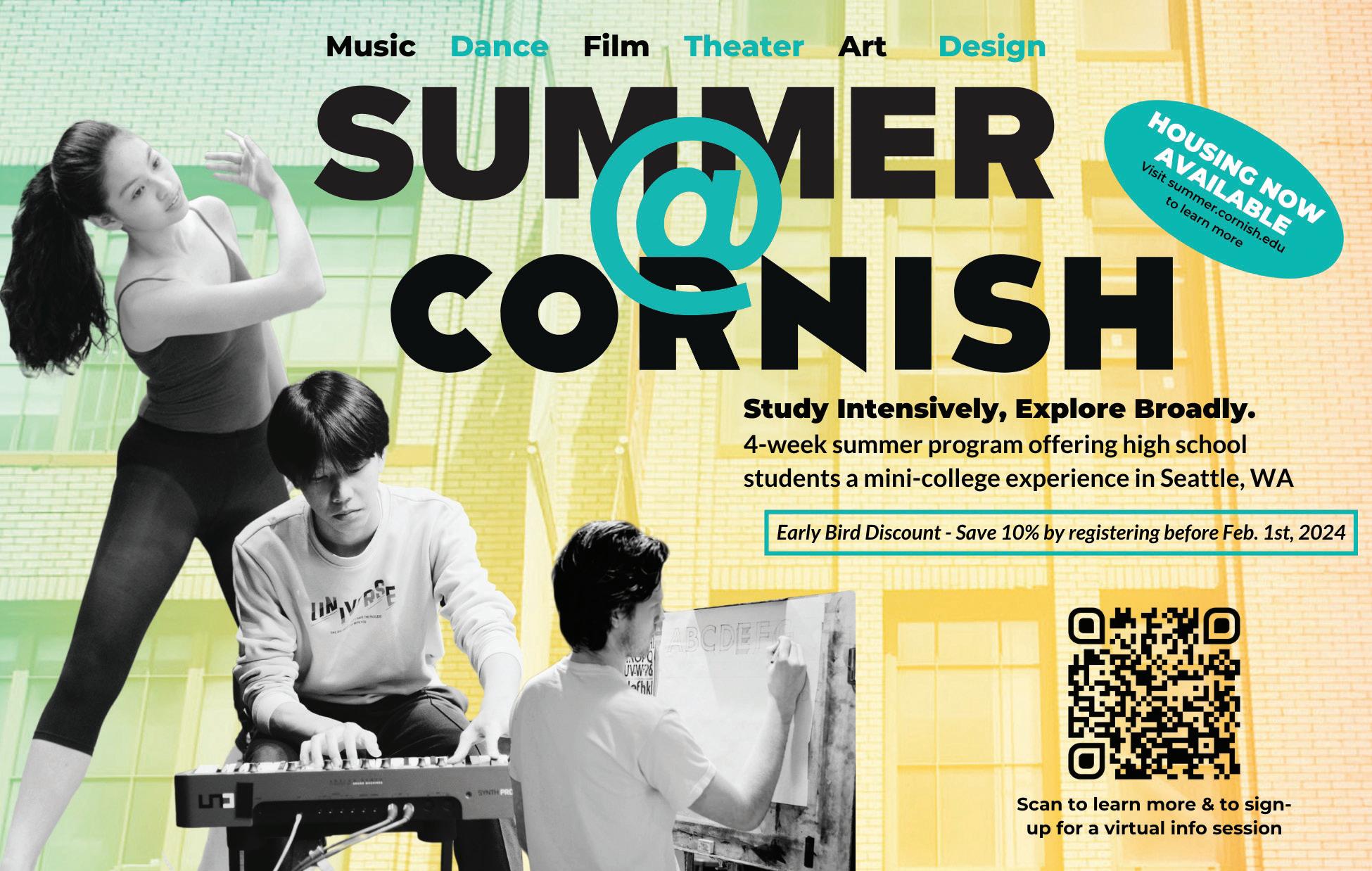
scad.edu/summer



Looking for an art school or program? Here are some colleges that offer great degrees in music, theater, dance, graphic design, film production, arts management, gaming and more.
ALFRED UNIVERSITY
SCHOOL OF ART & DESIGN
Location: New York, NY
Majors: D, M, MT, T alfred.edu/about/arts-at-alfred Alfred University provides opportunities for students to create their own intersections by studying art history, ceramic art, drawing, design, fabrication, fibers, foundry, interactive media, internships, glass, neon, painting, photography, print media, sculpture, sonic art, video, and more within an open curriculum. In Performing Arts, students explore music performance, music sound studies, dance, theatre, performance design and technology, and more. Our programs develop the conceptual and technical skills necessary to pursue a career in the arts. Learn More »
Location: Plymouth, Devon, UK
Majors: FD, F, G, P, V, O aup.ac.uk
Arts University Plymouth is an independent, specialist arts university run by artists and designers for artists and designers. Established in 1856 and based in Britain’s Ocean City, Arts University Plymouth’s programmes redefine the relationship between media, fine art, digital technology, and handcrafted traditions. We were the highest-scoring arts university in the UK’s National Student Survey 2022, 2023, and 2024, and won #2 for Facilities from all UK universities in the Whatuni Student Choice Awards 2024. Learn More »
Location: Cleveland, OH
Majors: D, M, MT, T bw.edu/schools/conservatorymusic
Student-centered. Nationally acclaimed. BW’s undergraduate-only Conservatory cultivates meaningful learning and extraordinary performance in a supportive community. Located in the suburbs of Cleveland, Ohio, the Conservatory has strong connections to arts organizations, from the Cleveland Orchestra to Playhouse Square, and opportunities for students to collaborate and network with arts professionals, leading to career success. Learn More »
Location: Great Barrington, MA
Majors: D, F, M, P, T, V, O simons-rock.edu
Bard College at Simon’s Rock is the only college in the country specifically designed for students ready to enter college after the 10th or 11th grade and begin working on their Bachelor’s Degree two years early. Music students have the opportunity to earn an MA or MM through a Guaranteed Entrance Program in the Longy School of Music at Bard College. Please visit our website for more information about our Performing and Visual Arts Programs. Learn More »
Location: Jackson, MS
Majors: D, F, G, M, T, V belhaven.edu/arts
Belhaven University is one of only 39 colleges or universities in the U.S. nationally accredited in all four major areas of the arts: Visual Art, Dance, Theatre, and Music. Contact us for more information and to schedule your campus visit. Learn More »
Location: United Kingdom
Majors: D, F, M, MT, T bimm.university
At BIMM University, we provide an extensive range of courses in modern music, performing arts, filmmaking, and creative technology to over 8,000 students across 14 schools in the UK, Ireland, and Germany. We have a longstanding commitment to providing the highest quality education in creative industries, allowing students to maximize their career potential. Learn More »
Location: Nashville, TN
Majors: M, O theblackbirdacademy.com
The Blackbird Academy Professional School of Audio is consistently ranked in the nation’s top five audio/ engineering schools. We have a world-renowned reputation for our outstanding graduates in both our Live Sound & Studio Engineering Programs. We emphasize a mentor-based, hands-on education. Learn More »
Location: New York, NY & St. Petersburg, FL
Majors: T circlesquare.org
Circle in the Square is a 2 + 2 College experience. Students spend their first two years in Florida at Eckerd College and their final two years in New York City at Circle. Our actor training connects emotional truth with the power of imagination, cultivating artists with strong technique who will be prepared to thrive. We commit to an inclusive, diverse curriculum and culture, honoring our student’s uniqueness while challenging them to expand their perspectives and advance their craft. Learn More »
Location: Washington, D.C.
Majors: A, D, M, V, O corcoran.gwu.edu
The Corcoran School of the Arts and Design is dedicated to educating the next generation of cultural leaders. Offering over 20 undergraduate and graduate degrees, with 500 students, the Corcoran comprises creative arts, humanities, professional art, and museumworld curricula within George Washington University. Degrees offered include Art History, Classical Acting, Dance, Exhibition Design, Fine Arts, Graphic Design, Interaction Design, Interior Architecture, Museum Studies, Music, New Media Photojournalism, Social Practice, and Theatre. Learn More »
Location: Seattle, WA
Majors: D, F, G, M, MT, T, V, O cornish.edu
A: Architecture, D: Dance, FD: Fashion Design, F: Film, G: Graphic Design, M: Music, MT: Musical Theatre, P: Photography, T: Theatre, V: Visual/Fine Arts, O: Other
Cornish College of the Arts is a premier private college in Seattle, Washington, offering undergraduate Bachelor of Fine Art and Bachelor of Music programs in both the visual and performing arts. Located in the heart of Seattle, Washington, Cornish’s goal is to empower students to explore their creative endeavors while training to become multidisciplinary artists and creatives. Learn More »
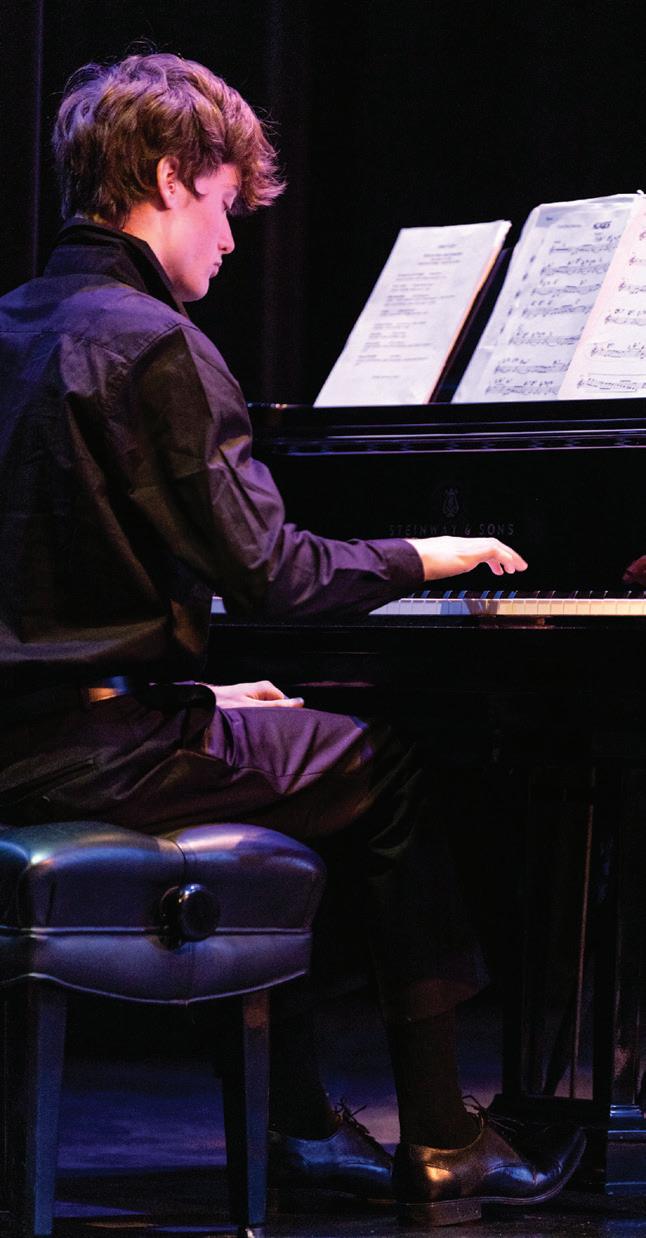
Location: Denver, CO
Majors: F, G, M, P, V, O artsandmedia.ucdenver.edu
Calling all you creators — whether you’re a filmmaker, musician, music producer, artist, graphic designer, animator, and so much more — you can find the courses you need to turn your passion into a career. At CU Denver, you will be surrounded by Mile High City’s cultural and creative scene. Learn More »

Location: Franklin, MA
Majors: D, MT, T, O dean.edu
Dean College is a private residential college located just outside Boston, in Franklin, MA, with unique programs geared to individual learning styles. Students can choose from programs in the School of the Arts, the School of Business, the Joan Phelps Palladino School of Dance and the School of Liberal Arts. A degree in theatre or arts and entertainment management from Dean College opens the door to a world of possibilities. Learn More »
Create your future at Simon’s Rock. Start college after 10th or 11th grade, and earn your BA degree two years early.
Performing and Visual Arts Programs: Theater, Painting and Drawing, Ceramics, Music, Photography, . . . and more! Learn more at simons-rock.edu/apply
ANTOINETTE
COLLEGE OF MEDIA ARTS & DESIGN
Location: Philadelphia, PA
Majors: A, D, FD, F, G, M, P, V, O drexel.edu/westphal
Drexel University’s Westphal College of Media Arts & Design is dedicated to educating students in Design, Media, and the Performing and Visual Arts. The college offers 18 majors in award-winning, technologically enhanced facilities, taught by faculty who work at the top of their fields. Students produce sophisticated work through creative, multi-disciplinary practices and provide meaningful experiences that promote individual and communal growth. Drexel is in the heart of Philadelphia, PA. Learn More »
Location: New York, NY
Majors: FD, G, P, V fitnyc.edu
One of New York City’s premier public institutions, FIT is an internationally recognized college of design, fashion, art, communications, and business. The college offers degrees in diverse subjects, such as Menswear, Footwear and Accessories Design, Fashion Design, Spatial Experience Design, Photography, Fine Arts, Jewelry Design, and Toy Design. We’re known for our rigorous, unique, adaptable academic programming, experiential learning opportunities, academic and industry partnerships, and commitment to research, innovation, and entrepreneurship. Learn More »
Location: Dix Hills, NY
Majors: D, F, G, M, MT, T ftc.edu
Known as Long Island’s Creative College, Five Towns College celebrated 50 years of excellence in educating students in the creative and performing arts. Undergraduate degrees in Audio/ Business, Film, Interactive Media Arts, Music, Communication, Musical Theatre & more attract students from around the globe. Request info at FTC.EDU/RFI Learn More »
Location: Tallahassee, FL
Majors: F film.fsu.edu
Our Film School offers a professional, career-oriented experience that creates a sense of community, not competition. As you work alongside peers and professors, you’ll gain valuable industry-standard skills and a story-first education to prepare for a future in film. The journey doesn’t end when you have your degree: Graduates have the opportunity to be assigned a mentor, who provides advice and support. This provides more than 96% of Film School graduates with meaningful work in the industry within 12 months of graduation. Learn More »
Location: Gettysburg, PA
Majors: F, G, P, V, O gettysburg.edu/academicprograms/sundermanconservatory
Gettysburg’s Sunderman Conservatory provides excellent musical training grounded in the liberal arts for students who seek to make music integral to their lives, whether as a career or a life-long avocation. Honoring our place as a dynamic conservatory within one of the nation’s leading liberal arts colleges, we foster rigorous study, creativity, intellectual curiosity, and joy in music. Learn More »
Location: Ithaca, NY
Majors: M, MT, T, O ithaca.edu/academics/schoolmusic-theatre-and-dance
A natural habitat for trailblazers and difference-makers, the Ithaca College School of Music, Theatre, and Dance empowers emerging artists to be agents of positive change. As a comprehensive college offering liberal arts and professional degree programs, Ithaca College provides an exceptionally broad array of possibilities for Music, Theatre, and Dance students. Study various aspects of composition, music education, production, stage management, and performance in music, theatre, and dance. Learn More »
Location: Grand Rapids, MI
Majors: A, FD, G, P, V, O kcad.edu
Located in downtown Grand Rapids, KCAD’s immersive creative learning environment offers a wide range of specialized degree programs in design, fine art, and art history. KCAD’s experienced faculty provides students with the expert instruction and personalized support they need to transform their creativity into a dynamic career. The classroom extends beyond campus, where KCAD’s strong relationships with arts organizations, industry-leading companies, and nonprofits provide students with transformative realworld learning experiences and invaluable professional network connections. Learn More »
Bring your talent to the premier progressive hub for the performing arts at the Ithaca College School of Music, Theatre, and Dance.
AUDITION AND INTERVIEW DATES
Theatre and Dance
December 7, 2024*
January 24-26, 2025 (NYC)**
February 1, 2025
February 3-6, 2025 (Chicago)**
February 8, 2025 (Los Angeles)**
February 15, 2025
APPLICATION DEADLINES
December 1
Music
December 14, 2024
January 25, 2025
February 8, 2025
February 22, 2025
Acting, Musical Theatre, Sound Recording Technology, Voice (all programs)
February 1
All other Music programs and non-performance Theatre programs
* Stage Management, Theatre Administration, Theatre Production & Design, and Theatre Studies Only
** Acting and Musical Theatre Only
Location: Leeds, UK
Majors: D, FD, F, G, M, P, V, O leeds-art.ac.uk
Leeds Arts University is the only specialist Arts University in the North of England, offering a wide range of internationally recognised programs. Founded in 1846 we have been at the forefront of Art and Design education for over 170 years. Our expert staff are practicing artists and designers and our award-winning facilities include a performance auditorium, a specialist arts research library and industry standard film, photography, music and fashion design studios. Learn More »
ithaca.edu/mtd/apply mtd@ithaca.edu


Location: Liverpool, UK
Majors: D, F, M, MT, T, V lipa.ac.uk
LIPA is renowned for our worldleading, university-level training in performing and creative arts. Co-founded in 1996 by Sir Paul McCartney, who remains our Lead Patron, collaboration is at the heart of our ethos. You’ll work with the next generation of creatives on major projects and disciplines. Subject areas include Acting, Dance, Filmmaking, Management, Music, Musical Theatre, Performance Design, Production Technology and Sound Technology. Learn More »
Location: Beverly, MA
Majors: F, G, P, V, O montserrat.edu
Montserrat College of Art is a small, private, affordable, residential college of communication art and design in Beverly, MA, a half-hour from Boston and blocks to the ocean. Arts immersion 24-7 leads to the Bachelor of Fine Arts degree. Required internships and engaging curricula help students find their creative professions. Learn More »
A: Architecture, D: Dance, FD: Fashion Design, F: Film, G: Graphic Design, M: Music, MT: Musical Theatre, P: Photography, T: Theatre, V: Visual/Fine Arts, O: Other
Location: New York, NY
Majors: F, MT, P, V nyfa.edu
New York Film Academy (NYFA) is a world-renowned film, media, and performing arts college that offers BFA and MFA degrees, short-term workshops, one and two-year programs, certificates, online classes, and Summer Camps for teens and kids. NYFA has campuses across the globe in New York, Los Angeles, Miami, Italy, Australia, and also online. NYFA students gain hands-on experience alongside industry professionals in Filmmaking, Acting for Film, Screenwriting, Cinematography, Producing, Game Design, Musical Theatre, Photography, and more. Learn More »
Location: New York, NY
Majors: O nysid.edu
The New York School of Interior Design (NYSID) is the only college in the country exclusively focused on the study of interior design and is consistently listed as one of the top-ranked interior design colleges in the world. Located in New York City, the international center of the design industry, NYSID’s expert faculty — typically award-winning, practicing designers — mentor students so they are prepared creatively and practically to launch successful careers.
Learn More »
Location: Sarasota, FL
Majors: F, G, P, V, O ringling.edu
Since 1931, Ringling College has cultivated the creative spirit in students from around the globe. The private, not-for-profit, fully accredited college offers a BFA degree in 11 disciplines and a BA in two. The College employs the studio teaching model and engages students through a comprehensive program specific to the major of study and focused on the liberal arts. Ringling College’s teaching model shapes students into highly employable and globally aware artists and designers.
Learn More »
Location: Fairfield, CT
Majors: MT sacredheart.edu/sacred-heartlife/student-events--activities/ performing-arts-program/ theatre-arts-program Choosing the Theatre Arts Program at Sacred Heart means entrance into a world where passion meets mastery. Our high-caliber, award-winning program focuses on vocals, acting, and movement in 12+ year-round productions. Theatre arts members build meaningful skills in communication, analysis, public speaking, teamwork, and problem-solving.
Learn More »
Location: Greensburg, PA
Majors: D, G, M, MT, V setonhill.edu/VPA
Creative, innovative, imaginative — this is what it means to be a Seton Hill University student! Seton Hill has a passion for the arts. That passion is reflected in the work of students and faculty who thrive as a community of artists, musicians, performers, therapists, and educators. Seton Hill offers a variety of programs in Art & Design, Music, Theatre & Dance, and beyond. Find YOUR Forward at Seton Hill University.
Learn More »
Location: Syracuse, NY
Majors: FD, F, G, M, MT, P, T, V, O vpa.syr.edu
The College of Visual and Performing Arts at Syracuse University is committed to the education of cultural leaders who will engage and inspire audiences through performance, visual art, design, scholarship, and commentary. We provide the tools for self-discovery and risk-taking in an environment that thrives on critical thought and action.
Learn More »
OF WISCONSIN: LA CROSSE DEPARTMENT OF THEATRE ARTS
Location: La Crosse, WI
Majors: D, MT, T uwlax.edu/academics/ department/theatre-anddance
Ranked No. 4 as a Best Public University in the Midwest by U.S. News and World Report, UW-La Crosse is a liberal arts institution with a population of 10,500 undergraduate and graduate students. Theatre and Dance offers an invigorating approach to theatrical training with seven areas of emphasis — Performance, Design/ Technical, Musical Theatre, Stage Management, Arts Administration, General Theatre Studies, and Dance. Learn More »
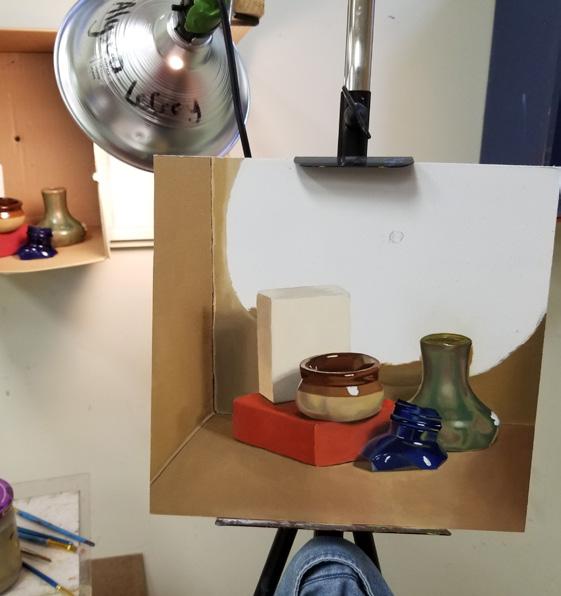
UNIVERSITYSCHOOL OF THE ARTS, MEDIA, PERFORMANCE
Location: Toronto, ON
Majors: D, F, G, M, T, V, O ampd.yorku.ca/join
The School of the Arts, Media, Performance & Design (AMPD) at York University is a dynamic hub for creative experimentation and expression. Located in Toronto, Canada’s cultural capital, AMPD offers a diverse range of programs and the opportunity to collaborate across disciplines. With a commitment to cultivating artistic excellence, new ideas and entrepreneurial skills, AMPD students learn by doing from day one, engaging in career-focused activities with industry-leading professionals. Learn More »

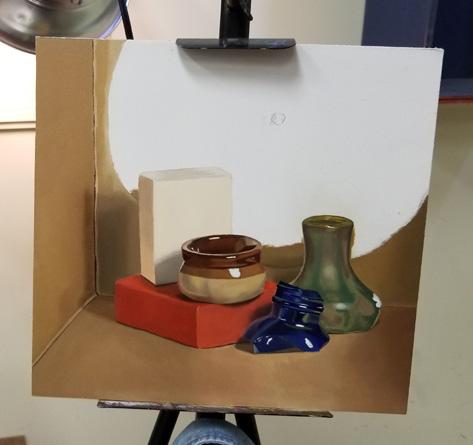

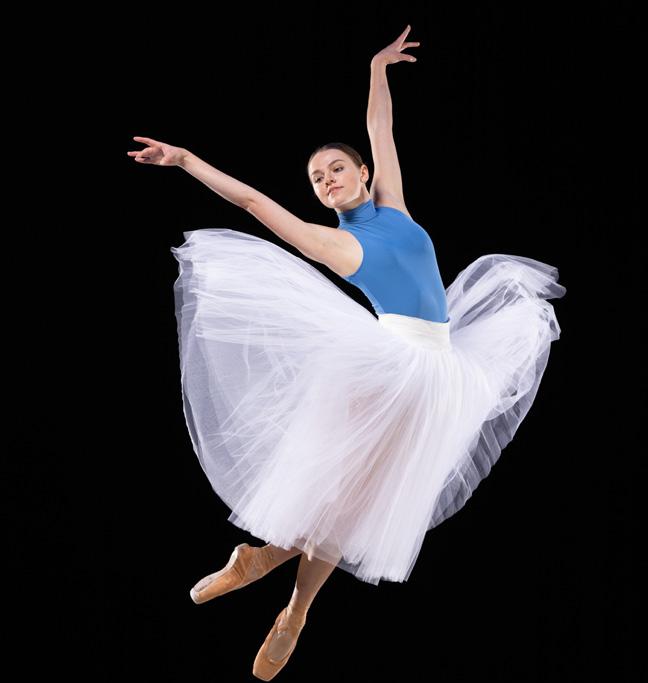
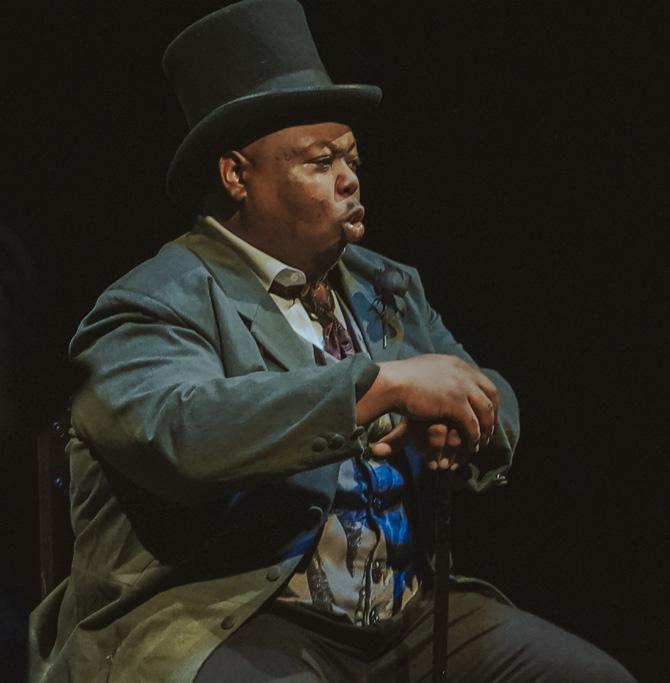
Location: New York, NY alfred.edu/about/community/ summer-camps
Alfred University Summer Arts Programs features arts workshops in a variety of media areas designed for participants working at all levels. Our high school institutes provide students with opportunities to learn more about specific career fields, to sample life on a college campus, and to meet other students with similar interests.
Learn More »

DOUBLE MAJOR AND 5TH YEAR IS FREE
Choose a double major and, if you need it, the fifth year is tuition free.* Selecting a second major is a great way to stand out to employers and graduate schools.
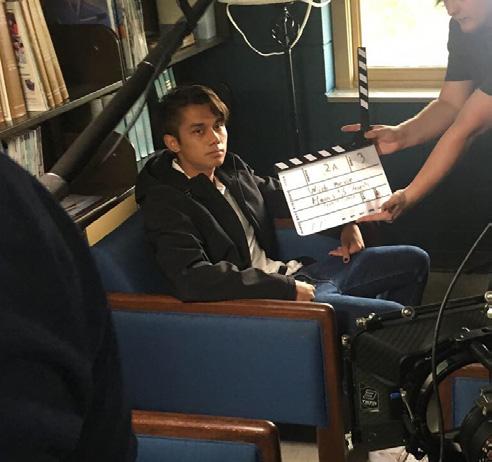
FREE ONLINE MASTER’S DEGREE*
When you start and finish your bachelor’s degree at Belhaven, you can add your master’s degree anytime, anywhere in our nationally acclaimed Best Online Program by U.S. News and World Report.
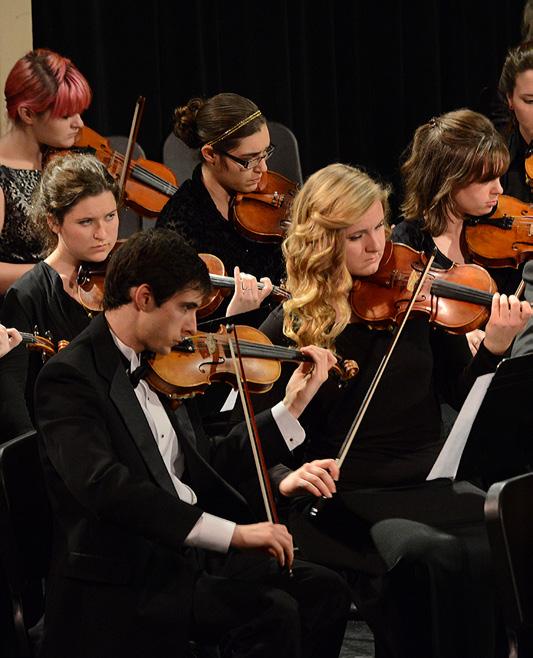

Established in 1856 and based in Britain’s Ocean City, Arts University Plymouth’s programmes redefine the relationship between media, fine art, digital technology and handcrafted traditions. Apply now aup.ac.uk
2024


Location: New York, NY atlanticactingschool.org/kidsand-teens/fall-classes
We invite your young ones to continue playing, creating, and forming lifelong friendships. In addition to creating characters and scripts, young actors have opportunities to produce their own work. Each class has a focus that varies from musical theater to sketch, improv, scene study, film/TV, and more, and all are rooted in the Atlantic Technique. After-hours care is available Monday through Thursday until 5:00pm at $40 per day. Learn More »
Location: Multiple locations in California & Online camp.integem.com
The #1 AR Art, Animation & Game Design Program! ACS WASC-accredited K-12 and precollege classes for cutting-edge art portfolios and college success. Perfect for K-12 students passionate about Art, Animation, Game Design, STEM, AI, Coding, and/or Robotics. Turn imagination into Holographic AR designs and teleport into your creation! Learn holographic AR art, 2D/3D animation, 3D game design, AI art, STEM, UI/UX, Adobe Photoshop, Adobe Character Animator, and more. Since 2018, we’ve taught students from 20+ countries! Learn More »
Location: South Portland, ME ciee.org/go-abroad/high-schoolstudy-abroad/summer/earlybirds-fly-free-lp
Imagine sketching in the streets of Florence or framing the perfect shot on the Charles Bridge in Prague. CIEE Global Navigator High School Summer Abroad programs take budding artists like you to some of the most iconic destinations in the world for an immersive experience in studio arts, drawing, fashion, creative writing, and more! Programs last 3 weeks and include courses, daily activities, and room & board. Get a $200 discount when you apply through TeenLife! Learn More »
Location: Rockville Centre, NY fashionmentorship.com
Unlock your student’s creative future with expert college admissions guidance for high school students pursuing careers in fashion design, art, architecture, and graphic design. Our services help gain acceptance into top schools, featuring faculty from leading institutions who offer essential expertise in portfolio development and the admissions process. With decades of industry experience, we provide support for both domestic and international applications, ensuring your student is wellprepared for a successful career and future opportunities. Learn More »
Location: Australia, United Kingdom, United States (Online and In-person)
discover.worldstrides.com
The High School Honors Performance Series showcases talented student performers by allowing them to study under master conductors and perform on some of the world’s greatest stages: Carnegie Hall, Sydney Opera House, and the Royal Festival Hall at Southbank Centre. We proudly offer choral and instrumental performance opportunities for high school musicians in grades 9-12 (or international equivalent). Performers are selected through a nomination and application process, which includes a performer biography and audition recording.
Learn More »
Location: Idyllwild, CA
idyllwildarts.org/academy
Idyllwild Arts Academy, recognized as the country’s premier residential arts high school, embraces a diverse community that extends beyond borders, attracting not only traditional high school students but also those taking a gap year to explore their artistic passions. Twice ranked by Niche as the Best Private High School for the Arts in America, the Academy opens its doors to students from grades 9-12, postgraduates, and those opting for a transformative gap year experience.
Learn More »
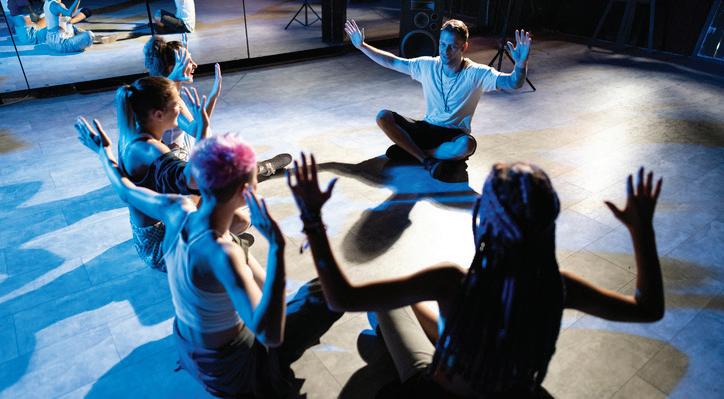
Location: Idyllwild, CA idyllwildarts.org/semesterexchange-program
This dynamic, personalized program allows students to further their academic and artistic skills for a single semester on Idyllwild Arts Academy’s beautiful mountaintop campus. Designed for international and domestic 10th and 11th-grade students, the Semester Exchange Program offers an individually customized curriculum in partnership with each student and their home school. Participants forge lifelong connections with artists from all over the world, gaining a global perspective while exploring Southern California’s rich cultural offerings. Learn More »
Location: Idyllwild, CA idyllwildarts.org/postgraduate-gapyear
Idyllwild Arts Academy, recognized as the country’s premier residential arts high school, embraces a diverse community that extends beyond borders, attracting not only traditional high school students but also those taking a gap year to explore their artistic passions. Twice ranked by Niche as the Best Private High School for the Arts in America, the Academy opens its doors to students from grades 9-12, postgraduates, and those opting for a transformative gap year experience. Learn More »
Location: Idyllwild, CA idyllwildarts.org/summer
Discover the magic of an Idyllwild Arts summer, where teen artists explore their creativity, build confidence, and forge lifelong friendships in a beautiful, supportive, and welcoming sleepaway camp environment in the stunning mountains of Southern California. Our immersive intensives and workshops are taught by renowned teaching artists, providing hands-on guidance while emphasizing personal values and achievement. Workshops include Classical Music, Jazz, Songwriting, Dramatic Arts, Visual Arts, Creative Writing, Dance, Fashion Design, and Film & Digital Media. Learn More »
Location: Online laurelsprings.com/best-onlineschool-for-performing-arts
At Laurel Springs, passion for the arts meets academic excellence in our flexible online curriculum. We support and evolve with your student’s performing arts journey –promising that no dream of theirs is too big, and no academic goal is out of reach. With us, there's no need for compromise between passion and education; students are empowered to excel both on stage and academically, maintaining their rhythm without skipping a beat. Learn More »
UNIVERSITY: PRE-COLLEGE SUMMER PROGRAMS
Location: Los Angeles, CA summer.lmu.edu/arts
Unleash your creativity in a supportive and enriching environment this summer at Loyola Marymount University and receive hands-on training from creative art and entertainment industry professionals. Join us in Los Angeles for an unforgettable summer of artistic expression and personal growth, where you can expand your skills, build your portfolio, and immerse yourself in LMU’s vibrant pre-college community. Arts and entertainment summer programs are available to current high school students ages 14-18.
Learn More »
Location: Los Angeles, CA nslcleaders.org/youthleadership-programs/ ilmproduction-and-screenwriting
At the NSLC on Film Production & Screenwriting, you’ll experience the art of cinematic storytelling as you collaborate with your team to produce a short film. Learn the filmmaking process through immersive workshops about screenplay formatting, character development, directing, cinematography, and editing. Interact with guest speakers from a variety of backgrounds who bring practical knowledge and real-world experiences to the program. Visits to film studios and the Academy museum round out the program activities.
Learn More »
Location: Los Angeles, CA nslcleaders.org/youthleadership-programs/musicindustry-production
At the NSLC on Music Industry & Production, you’ll master music production as you collaborate with your peers, tour LA studios, and gain valuable industry insights. Get comfortable with popular DAW programs used by the pros, and discover new recording and editing techniques as you and your team develop your own album concept and record your first single. Feedback from leading producers and artists will help prepare you for success in the industry. Learn More »
Location: New York, NY nslcleaders.org/youthleadership-programs/theater
At the NSLC on Theater, you’ll create and collaborate with your peers to design, rehearse, and produce your own show while discovering a variety of theatrical career paths. Experience theater through interactive workshops that explore the art of performance, stagecraft, and the collaborative process that brings stories to life on stage. Interact with guest speakers from various backgrounds who bring practical knowledge and real-world experiences to the Theater program. Learn More »
Location: New York, NY & Paris, France
cpe.newschool.edu/youth-andpre-college/parsons-academysummer-programs
Develop a talent or advance your studies while experiencing life in a university setting. Parsons offers summer courses for students in grades 3 through 12 that allow them the same access to world-class Parsons faculty as undergraduate art and design students. We offer Summer Intensive Studies in NYC and Paris as well as Parsons Summer Academy. Learn More »

Location: New York, NY sps.nyu.edu/high-schoolacademy/programs/career-edge. html
Experience NYU and explore careers this summer! Immerse yourself in a one-of-a-kind college and career readiness experience at NYU's Career Edge Summer High School Program. These one-week summer sessions allow you to explore career possibilities and gain a competitive edge on your college applications. Meet friends from around the world, explore NYC, and live in an NYU dorm! Get a taste of the real-world workplace while preparing for college life—only at NYU SPS! Learn More »
Location: Online fashionanddesign. precollegeprograms.org Parsons Paris offers an online program designed for those seeking a future in fashion. Explore subjects like fashion business, design, sustainability, and building a brand. All online courses are designed by fashion experts and feature engaging videos that enhance your learning. Study anytime, anywhere, at your own pace, and receive a Certificate of Completion from Parsons Paris. Learn More »
Location: Poughkeepsie, NY vassar.edu/powerhouse
The Powerhouse Theater comes to life each summer on the Vassar College campus to provide a nurturing environment for students and professionals to learn from one another. The Powerhouse Theater Training Program provides aspiring theater professionals a chance to immerse themselves in the study of acting, directing, or playwriting. The Training Company also offers free performances throughout the season. The Professional Season produces developmental workshops on plays and musicals and conducts readings of worksin-progress. Learn More »
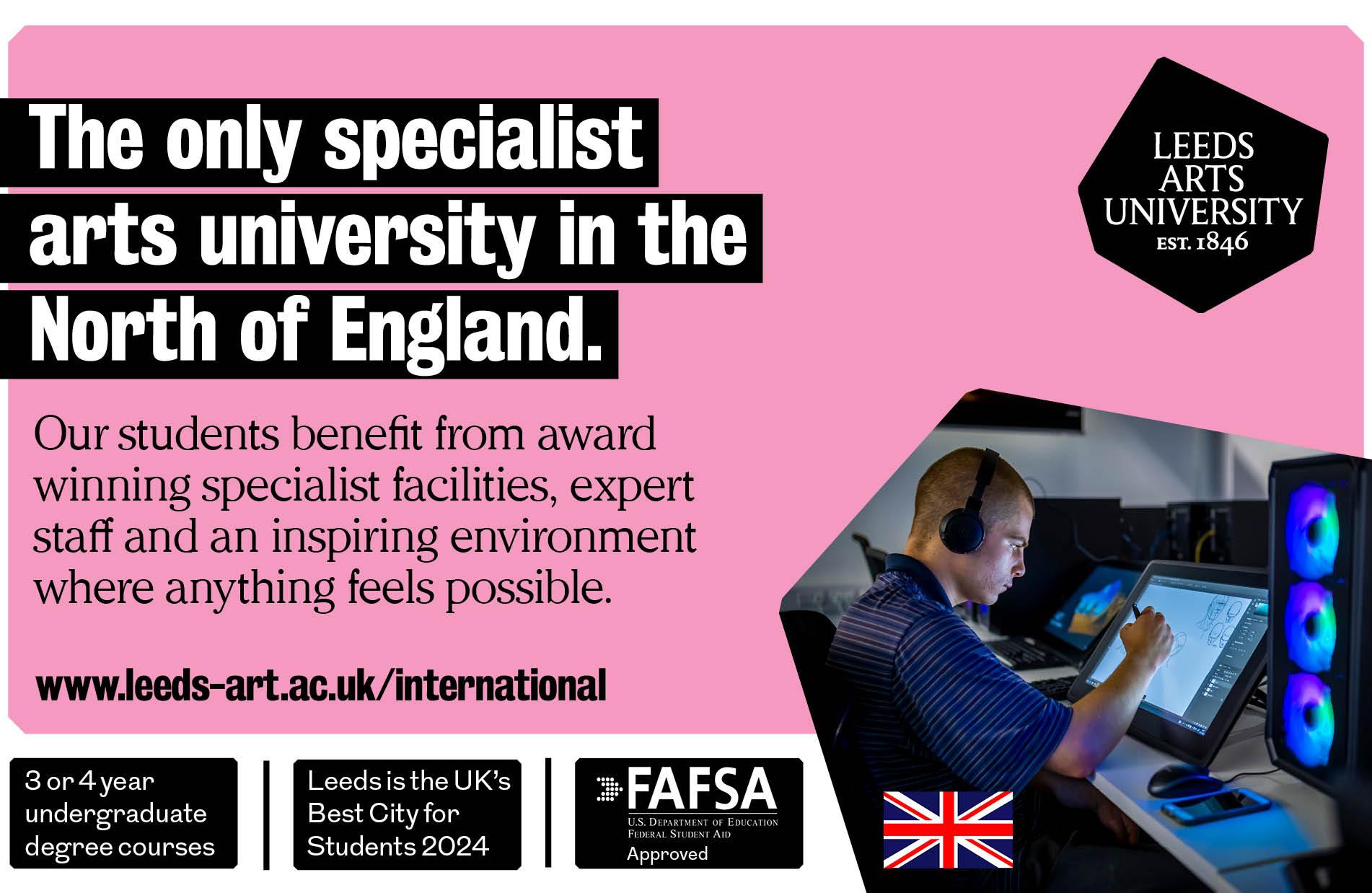
Location: Savannah, GA
scad.edu/academics/pre-college-programs
Start your SCAD journey early with a pre-college program! Explore new avenues of artistic development and spark your imagination at The University for Creative Careers. SCAD offers pre-college programs during the summer for high school students of all ages to pursue art and design disciplines while working alongside peers from all over the world — and offers ideal opportunities for artists at all levels to create, learn, and grow. Learn More »
Location: Online precollege.syr.edu
For 64 years, Syracuse University Office of PreCollege Programs has provided high school students an opportunity to explore college majors and potential careers through its renowned precollege programs. Students choose from over 100 credit or noncredit courses on campus or online. Courses are taught by Syracuse University faculty and instructors. Students learn to balance freedom and responsibility much like college students and return home feeling confident, enthusiastic, and college-ready. Learn More »

OCCUPATION
Industry profile
Industry profile
& MUSIC TEACHERS
Industry profile
JOB SUMMARY
Art therapists use creative expression to help people heal and grow emotionally.
Editors oversee the creation and production of diverse media, from print and digital publications to marketing materials, collaborating with writers to ensure highquality output.
Fashion designers create clothing, accessories, and footwear.
Film and video editors craft visual narratives by assembling footage, while camera operators capture the raw material that brings those stories to life.
Graphic designers create visual concepts, using computer software or by hand, to communicate ideas that inspire, inform, and captivate consumers.
Industrial designers combine art, business, and engineering to develop the concepts for manufactured items.
Interior designers make indoor spaces safe, functional, and beautiful by determining space requirements and selecting essential and decorative items.
Art, drama, and music teachers demonstrate different artistic techniques and prepare students to create their own projects, performances, and work.
Art, drama, and music teachers demonstrate different artistic techniques and prepare students to create their own projects, performances, and work.
or Equivalent
& EXHIBIT
& ANIMATORS
Music directors lead musical groups during performances and recording sessions. Composers write and arrange music in many different styles.
Painters, sculptors, and illustrators create visual art using various techniques and mediums.
Producers and directors create motion pictures, television shows, live theater, commercials, and other performing arts productions.
PR specialists create and maintain positive public images for their clients — they can also help clients grow their share of voice and establish themselves as industry thought leaders
Set and exhibit designers craft immersive environments for film, television, theater, and exhibitions.
Social media specialists manage a brand’s online presence across platforms.
Sound engineering technicians capture, manipulate, and enhance sound for various media, from films to podcasts.
Special effects (SFX) artists and animators create images that appear to move & visual effects for various forms of media & entertainment.
Technical writers prepare how-to guides, instruction manuals, journal articles, and other supporting documents to communicate complex, technical info more easily to diverse audiences.
Writers craft narratives across different formats, from novels and poetry to screenplays and graphic novels — and everything in between.
VISIT OUR BLOG TO SEE THE FULL LIST!
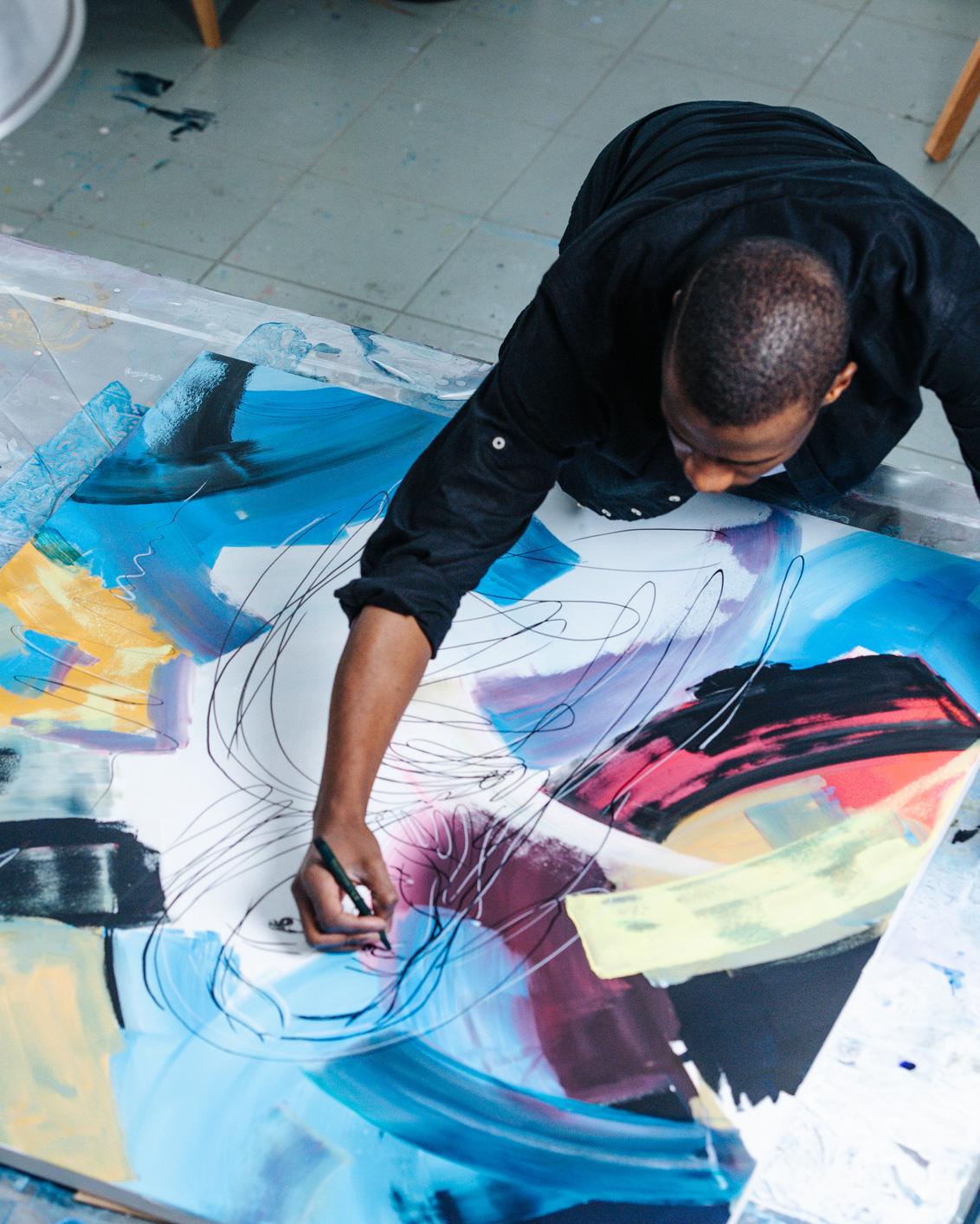

DANCE, B.A. AND B.F.A.
Triple Track:
•Ballet
•Jazz/Tap/Hip-Hop
•Modern
Focus Areas:
•Choreography
•Dance Pedagogy/Education
•Dance Studies
• Per formance
•Pre-Athletic Training
•Studio Management
dean.edu/dance
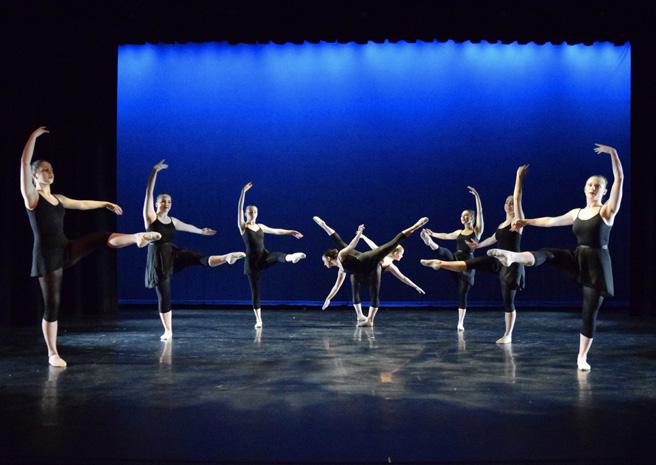

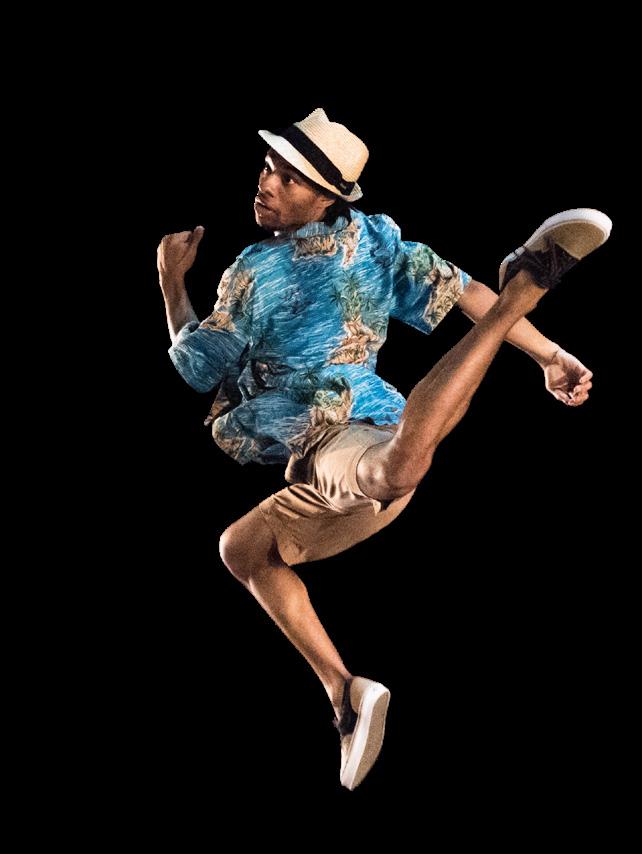

ARTS & ENTERTAINMENT MANAGEMENT, B.A.
THEATRE, B.A. AND B.F.A.
•Acting
•Musical Theatre
• Per formance
•Production and Design
•Theatre Studies
dean.edu/arts
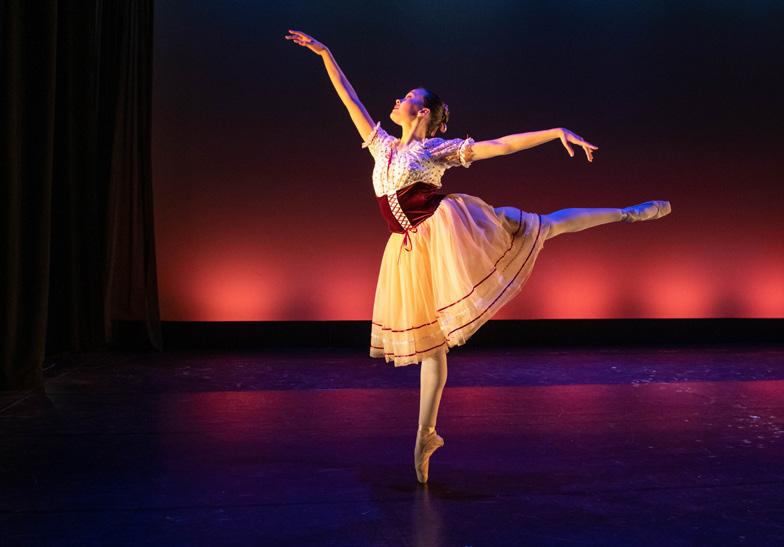

Explore, Visit, Apply and Audition
SCHOLARSHIPS AND FINANCIAL AID AVAILABLE